Spanish Travel Vocabulary
There is a printable worksheet available for download here so you can take the quiz with pen and paper.
The scorecard of a champion
100% needed

Other Games of Interest

Latest Quiz Activities
- An unregistered player played the game 2 hours ago
- An unregistered player played the game 5 hours ago
- An unregistered player played the game 8 hours ago
Spanish Travel Vocabulary — Quiz Information
This is an online quiz called Spanish Travel Vocabulary
You can use it as Spanish Travel Vocabulary practice, completely free to play.


How Well Do You Know Spanish Vocabulary?
Answer 60 questions and find out how well you know your Spanish vocabulary.

Convenient, Fast and Free

You can take the quiz as many times as you want – a great way to practice!

The quiz is completely free! No credit card details required.

Flexible and convenient, the quiz works on any device.

Share your results on social media or via email. Invite your friends and see who is the best.
Most Recent Scores – TYL Spanish Vocabulary Quizzes
Why take our spanish vocabulary quiz.
One of the most widely spoken languages in the world, Spanish is the official language in 22 countries and is spoken by over 400 million people, not only in Spain but in other parts of the world as well. As a result, the Spanish language, culture, and influence have become global. From literature to music, film, dance, cuisines, and even other local languages, Spanish has truly conquered the world!
With such widespread usage and influence, it is no wonder that a lot of people are eager to learn and master Spanish. If you are one of those, there are plenty of resources available to aid your language journey. You can get started by answering our free Spanish Vocabulary Quiz and embarking on a journey to discover the wealth and beauty of the Spanish language! Our Spanish quiz is a great way to get a little extra Spanish practice and get a good evaluation on your level of fluency with the language.
If you would like to get started with improving your Spanish vocabulary, this quick quiz in Spanish is just the thing that you need.
Considered the second most widely spoken language in the world, Español or Spanish, is a language with a rich history and influence. With Spain’s colonial expansion during the Age of Discovery, its language and culture has helped shape the culture of over 20 countries across the globe, including the Americas, parts of Africa, and parts of Asia. Today, there is an estimated 460 million native Spanish speakers.
The origins of Spanish can be traced to the Iberian Peninsula, where it is derived from Vulgar Latin that is spoken by common people in the Roman Empire. With the influence of other regional dialects such as Arabic and other Romance languages, the language that we know today was developed.
Over centuries, the influence of Spanish has inspired different art forms such as literature, film, and music. But it was the 16 th and 17 th centuries that was thought of as the golden age of Spanish literature. It was during this period that the iconic work of famous Spanish writer Miguel de Cervantes was written—“Don Quixote,” which is often called the first modern novel in Western literature. The language continued to grow, giving rise to famous writers like Federico Garca Lorca, Gabriel Garca Márquez, and Pablo Neruda, who made important contributions to world literature and won recognition around the world. Today, artists, singers, and film-makers, from Spanish-speaking countries have made a big impact around the world with their work.
Did you know that Spanish has influenced various musical genres, including salsa, tango, and flamenco?
Today, as proof of its global significance, Spanish is one of the six official languages of the United Nations, and is widely used in foreign diplomacy and trade.
Below are a few languages that are related to Spanish in that they also belong to the Italic branch of the Indo-European language family:
Spanish is the most famous foreign language to learn in America and Europe. The interest for Spanish courses has multiplied worldwide in ten years.
- Spanish Language: A Cultural and Linguistic Gem
- 12 irresistibly interesting facts about the Spanish language
- Five popular books in Spanish- to start your language journey
- 7 Best Ways To Learn Spanish (Like a Pro)
- 7 best Spanish comedy shows to learn the Spanish language
- 10 Fun similarities between Italian and Spanish culture
How it works

- Take the Quiz Select Spanish and start the quiz. No need to create an account or provide credit card details – it’s free!

- Get your results After taking the quiz, you will receive your results by email. And for a small fee, get your own personal certificate!

- Share your results Let your boss know, invite your friends, post on social media… Show off your skills, it’s okay to brag!
Want a more thorough assessment of your Spanish language skills? Try taking our comprehensive Spanish placement test to learn your CEFR and ACTFL scores.
855-997-4652 Login Try a Free Class
100+ Spanish Travel Vocabulary Words for Latin America
If you plan to visit Latin America on vacation, knowing Spanish travel vocabulary is essential to make your experience safe, smooth, and pleasant.
Latin American Spanish is rich and diverse. While there’s a lot of regionalismo (regional vocabulary) in Latin America, many words are considered neutral, meaning almost everyone understands them, and they make communication easier.
Read this blog post to discover a ton of Spanish travel vocabulary words to use on your next visit and learn to talk about your vacation in Spanish like a pro!
Important Spanish Travel Vocabulary
Looking for a trusted source for words to use on your next visit to the beautiful lands of Latin America? This vocabulary lesson is divided into categories to give you easy access to the basic Spanish travel vocabulary words you need to know.
Documentos Para Viajar (Travel Documentation)
In order to travel, you need some important documentation to assure your safety and access to the place you want to go. In some countries, you simply need a passport to enter, while in others require a visa to gain access.
To learn what these documents, preparations, and requirements are called in Spanish, check out the following vocabulary list:
Instalaciones de Viaje (Traveling Facilities)
Now that you have all your paperwork in order, it’s time to learn about the places you’ll pass through while traveling to your destination!
Transporte (Transport)
There are several ways you can reach your destiny while traveling in Latin America. The mode of transportation may be terrestre (terrestrial), marítimo (marine), or aéreo (aerial).
Example Sentences
Want to know how to use these words to talk about your experience while traveling or asking about them in Spanish? Here are some examples!
El tuc-tuc es un medio de transporte barato. The auto rickshaw is a cheap mode of transportation.
Cuando estés en Buenos Aires es buena idea que uses el metro. When you are in Buenos Aires, it is a good idea to use the subway.
Del aeropuerto nos llevaron en bus al muelle donde abordamos el crucero. From the airport, they took us by bus to the dock where we boarded the cruise ship.
El Uber nos cobró más barato que un taxi. The Uber charged us less than a taxi.
¡Paseamos por el Lago de Atitlán en una lancha que iba muy rápido! We rode around Lake Atitlan in a boat that went very fast!
¿Cuánto cuesta el pasaje? How much is the ticket?
Por favor, den lugar a que entre más pasajeros. Please allow more passengers to enter.
Asegurate de tomar el bus en el horario que funciona. Be sure to take the bus in the schedule it works.
¿Me daría jalón? Can I catch a ride with you?
No se pare en el bote cuando este se esté moviendo. Don’t stand up in the boat while it is moving around.
Aborde el tren de forma rápida. Board the train quickly.
Practice makes perfect, and a great way to review and practice what you’re learning is through worksheets! Download this PDF with a fun travel vocabulary crossword about transport to solidify your newly acquired knowledge!
Download FREE Travel Vocabulary Words Crossword Puzzle!
Type your name and email below to get a free crossword puzzle about travel vocabulary words to practice your new vocabulary!
Alojamiento (Lodging)
Now that you know what you need in preparation to travel, and how you are getting to your destination, it’s time to think about el alojamiento , or lodging.
Lugares turísticos (Tourist Sites)
Once you are settled into a place to stay, check out the lugares turísticos (tourist sites) you want to visit. The following Spanish travel vocabulary list includes some general places that you can find throughout Latin America when you visit.
Verbs
You can’t travel to Latin America without knowing Spanish travel verbs. They’re one of the most important elements of Spanish travel vocabulary when talking about your vacation in Spanish!
Me encantó relajarme en el hotel. I loved relaxing at the hotel.
Al momento de registrarme me dieron mi llave de habitación. At the check-in they gave me my room key.
Me gustó ir a parrandear con mis amigos. I liked to go to parties with my friends.
Es recomendable reservar una mesa en el restaurante del hotel. It is recommended to reserve a table at the hotel restaurant.
Alquilar un auto siempre es buena idea si te gusta moverte con libertad. Renting a car is a good idea if you like to move freely.
Common Phrases to Make Travel Easier
It never hurts to know some basic Spanish travel phrases to add to your vocabulary.
En el aeropuerto – At the Airport
Su pasaporte y boleto, por favor. Your passport and boarding pass, please.
¿A dónde se dirige? Where are you going?
¿Cuál es el motivo de su visita? What is the reason for your visit?
¿Dónde está la puerta de abordaje? Where is the boarding gate?
Por favor, tome su equipaje de la cinta. Please take your luggage from the carousel.
En el hotel – At the Hotel
¡Hola! ¿Podría ayudarme a registrarme? Hi! Can you help me with the check-in?
Servicio a la habitación, por favor. Room service, please.
¿Puede darme otra toalla? Can you give me another towel?
¿Se puede usar la piscina? Can I use the pool?
¿Podría llamarme a un taxi? Can you call me a cab?
En un restaurante – In a Restaurant
¿Podría traerme la carta? Could you please bring me the menu?
Me gustaría tomar… I would like to drink…
¿Quieres algo para comer? Do you want something to eat?
¿Tiene comida vegana? Do you have vegan food?
Disculpe, soy alérgica/o a ________. ¿La comida incluye ese ingrediente? Excuse me, I am allergic to _______. Does the food include this ingredient?
De Vacaciones – On Vacation
Disculpe, ¿qué tan lejos está la playa? Excuse me, how far is the beach?
¿Cuanto es el tipo de cambio hoy? How much is the exchange rate today?
¿Puedo cargar mi teléfono aquí? Can I charge my phone here?
¿Usted habla inglés? Do you speak English?
Lo siento, no hablo español . Sorry, I don´t speak Spanish
¿Aceptan dolares? Do you accept dollars?
¿Cuanto cuesta? How much is it?
¿Cuanto es lo menos? What is your best price?
Spanish Travel Vocabulary Quiz
Let’s practice what we learned today! Choose the correct answer to the following questions:
1. Where do you take the airplane?
2. what should you do to have money for the place you visit, 3. you can use them to ask for a favor, 4. you need this to enter some countries, 5. what is the name of the places you and other tourists visit, 6. you board them when going on vacation at the sea, 7. is recommended you get a copy of these in your luggage in case you miss them, 8. you can go to this place in case of an emergency or sickness., 9. you need to do this to assure the host you are going to stay in their hotel., 10. is a place where you pay to sleep and have breakfast., practice your spanish travel vocabulary.
Is never too early or late to learn Spanish vocabulary words to travel around Latin America and communicate freely with the locals. Sign up for a free class to practice your travel phrases with a certified, native Spanish-speaking professional who can help you prepare for the best trip of your life. Visit the breathtaking places throughout Latin America and share memories with your loved ones! What are you waiting for?
Ready to learn more Spanish vocabulary? Check these out!
- Earth Day Projects for Kids + Spanish Earth Day Vocabulary
- How to Talk About the Temperature in Spanish: Fahrenheit, Celcius, and Descriptions
- Car Parts Spanish Vocabulary List: Learn Using Pictures
- Top 15 New Year’s Resolutions in Spanish
- Talk About Hurricanes And The Weather in Spanish
- Spanish Words with Multiple Meanings in Latin America
- World Mental Health Day: A Vocabulary Guide for Mental Health Workers
- Expressing Appreciation in Spanish on World Teachers’ Day
- Recent Posts
- An Easy Vocabulary Guide to Describe the Post Office in Spanish - February 10, 2023
- Guatemala’s Biggest, Most Colorful Market: Chichicastenango - December 28, 2022
- 8 Sad Spanish Songs for When Your Heart Is Broken - December 6, 2022
Related Posts
45+ mission trip spanish phrases you need to know, 44 essential spanish quotes and proverbs to fuel your motivation, spanish body parts: vocabulary, idioms, and culture, spanish 101: greetings and farewells, leave a comment cancel reply.
Your email address will not be published. Required fields are marked *
- Why Lingo-Late?
Practice with Spanish for Travel Quiz

Planning a trip to Spain or another Spanish speaking country? Practice with the Spanish for Travel Quiz essential words and expressions such as greetings and polite phrases. You’ll find here some the vocabulary of the first two lessons of Spanish for Travel. Maybe you need to remind yourself of some of the essential Spanish words and expressions for travel. Or if you just want to learn 20+ essential words and phrases: click on Spanish 1 for Travel or Spanish 2 for Travel . There you can also record yourself to practice your pronunciation. We have found this: Just knowing the Spanish greetings and polite expressions will make your trip so much more enjoyable. Even if your pronunciation is not perfect, you’ll often be rewarded with a smile for trying. And especially in small towns or places off the beaten path greetings are expected even from strangers! You want to spend a little more time preparing for your next trip to a Spanish speaking country? Go to Gamesforlanguage.com, our completely FREE language learning sister site. Here you have the choice of registering for learning and practicing Spanish with a travel-story. You can also just click on one of our many Spanish Language Games (no registration required). In addition to the free Spanish courses and games, Gamesforlanguage also offers free Spanish Quick Games, Podcasts and articles about language learning. In particular, you might enjoy our post: Travels in Spain . It is a compendium of our travel experiences and month-long stays in Barcelona and Seville. These posts were published on Gamesforlanguage.com.
Spanish For Travel Quiz
Choose the correct translation!

Your answer:
Correct answer:
Your Answers
About Lingo Late
Eight years ago we started Gamesforlanguage.com, a site to learn German, French, Italian and Spanish playfully, with easy games and a travel story. When traveling to countries, where we didn’t speak the language (Japan, China, Sweden, Norway, Denmark, Croatia, Czech Republic, Hungary), we used popular travel guides and self-teaching programs and apps to learn at least the basics. But finding and practicing the basic words and phrases that we needed was not that easy or convenient. Neither the printed travel guides nor the online programs and apps were practical. This gave us the idea for Lingo-Late: An easy way to learn a a few language essentials.
- Choose a Language
- Language Learning Resources
Get in Touch
Email: [email protected]
- Random Quiz
- Search Sporcle
Spanish Travel Vocab
Can you name the spanish travel vocab, quiz scoreboard challenge, recently published.

More to Explore
Quiz from the vault, featured blog post.

You Might Also Like...
Today's top quizzes in language, browse language, today's top quizzes in vocabulary, browse vocabulary, trending topics, more by: juniormints, go to creator's profile, your account isn't verified, report this user.
Report this user for behavior that violates our Community Guidelines .

Spanish School in Mexico City

Spanish Travel Vocabulary: +50 Essential Words and Phrases for Your Next Trip
Are you planning a trip to a Spanish-speaking country like Mexico? Whether it’s for business or pleasure, knowing some basic Spanish travel vocabulary can go a long way in making your trip more enjoyable. From ordering food to asking for directions, having a few key phrases in your back pocket can help you navigate your way through any situation where you might need to speak Spanish.
Table of Contents
One of the most important phrases to know when traveling in a Spanish-speaking country is “¿Dónde está…?” This means “Where is…?” and can be used to ask for directions to a specific location, such as a restaurant, museum, or hotel. Another useful phrase is “Quiero reservar una habitación” which means “I want to book a room.” This can come in handy when you arrive at your destination and need to find accommodations.

Other essential Spanish travel vocabulary includes ordering food and drinks at restaurants or coffeshops. “La cuenta, por favor” means “The bill, please” and is a polite way to ask for your check at a restaurant. “Una cerveza, por favor” means “A beer, please” and is a simple way to order a drink. With a few basic phrases under your belt, you’ll be able to communicate more effectively and make the most of your trip to a Spanish-speaking country.
Basic Spanish Greetings
Hola and buenos días.
If you want to greet someone in Spanish , the most basic way to do it is by saying “Hola” or “Buenos Días”. “Hola” is equivalent to “Hello” in English, and “Buenos Días” means “Good Morning”. You can use these greetings at any time of the day, but “Buenos Días” is only appropriate to use in the morning.

Mucho Gusto and ¿Cómo Te Llamas?
When meeting someone new, it’s polite to introduce yourself and ask for their name. In Spanish, you can say “Mucho Gusto” which means “Nice to meet you”. After that, you can ask “¿Cómo te llamas?” which means “What’s your name?”.
¿Cómo Estás? and ¿Cómo Está?
If you want to ask someone how they are doing, you can say “¿Cómo estás?” if you are talking to someone familiar or “¿Cómo está?” if you are talking to someone more formal or older than you. Both of these phrases mean “How are you?”.
Remember that in Spanish, it’s common to use greetings and small talk before getting into the main topic of the conversation. Using these basic greetings can help you make a good first impression and show that you are friendly and polite.
- Use “Hola” or “Buenos Días” to greet someone.
- Say “Mucho Gusto” to introduce yourself.
- Ask “¿Cómo te llamas?” to ask for someone’s name.
- Use “¿Cómo estás?” or “¿Cómo está?” to ask how someone is doing.
Essential Spanish Travel Phrases
When traveling to a Spanish-speaking country, it’s always helpful to know some basic phrases to make your trip smoother. Here are some essential Spanish travel phrases to get you started.
Por Favor and Gracias
“Por favor” means “please” and “gracias” means “thank you.” These two phrases are essential when interacting with locals in Spanish-speaking countries. Here are some examples of when to use them:
- When ordering food: “Quisiera una mesa para dos, por favor” (I would like a table for two, please).
- When asking for directions: “¿Podría decirme cómo llegar al museo, por favor?” (Could you tell me how to get to the museum, please?).
- When receiving help: “¡Muchas gracias por su ayuda!” (Thank you very much for your help!).

Estoy Perdido and ¿Habla Inglés?
“Estoy perdido” means “I am lost” and “¿Habla Inglés?” means “Do you speak English?” These phrases can be especially useful when navigating a new city or asking for directions. Here are some examples:
- “Perdón, estoy perdido. ¿Podría ayudarme a encontrar la calle X?” (Excuse me, I am lost. Could you help me find X street?)
- “¿Habla Inglés? No hablo mucho español” (Do you speak English? I don’t speak much Spanish).
Quisiera and Aquí
“Quisiera” means “I would like” and “aquí” means “here.” These phrases can be useful when ordering food or making purchases. Here are some examples:
- “Quisiera un café con leche, por favor” (I would like a latte, please).
- “¿Tiene este suéter en mi talla? Quisiera probármelo” (Do you have this sweater in my size? I would like to try it on).
- “¿Cuánto cuesta este recuerdo aquí?” (How much does this souvenir cost here?).
By learning these essential Spanish travel phrases, you’ll be able to communicate more effectively with locals and make the most of your trip.
Spanish Vocabulary for Transportation
When traveling to a Spanish-speaking country, it’s important to know some basic transportation vocabulary to get around easily. Here are some common Spanish words and phrases related to transportation.
Airport and Airplane
If you’re flying to your destination, you’ll want to know some airport and airplane vocabulary.

- El aeropuerto – airport
- El avión – airplane
- El vuelo – flight
- La terminal – terminal
- El mostrador de facturación – check-in counter
- La puerta de embarque – boarding gate
- El equipaje – luggage
- La maleta – suitcase
- El control de seguridad – security checkpoint
Train and Bus
If you’re traveling by train or bus, you’ll need to know some vocabulary related to stations and schedules.

- El tren – train
- El autobús – bus
- La estación – station
- El horario – schedule
- El billete – ticket
- El andén – platform
- El tren de cercanías – commuter train
- El autobús urbano – city bus
Taxi and Uber
If you prefer to take a taxi or Uber , here are some useful words and phrases.

- El taxi – taxi
- El conductor – driver
- La tarifa – fare
- El taxímetro – meter
- La dirección – address
- El destino – destination
- El punto de recogida – pick-up point
- El número de teléfono del taxi – taxi phone number
Remember, knowing some basic Spanish transportation vocabulary can make your trip much easier and less stressful. So, whether you’re taking a plane, train, bus, taxi, or Uber, be sure to brush up on your vocabulary before you go.
Spanish Travel Vocabulary for Accommodation
Hotel and hostel.
If you’re planning a trip to Latam, you’ll need to know some basic Spanish vocabulary for accommodation. Whether you’re staying in a hotel or a hostel, it’s important to be able to communicate with the staff. Here are some key phrases to help you out:

If you’re staying in a hostel, you’ll want to know some additional vocabulary:
Inn and Room
If you’re looking for a more traditional Spanish accommodation experience, you might want to stay in an inn. Here are some phrases that will be helpful when communicating with the staff:
No matter where you stay, it’s always a good idea to learn some basic Spanish phrases to help you communicate with the locals. With these vocabulary words, you’ll be able to navigate the Spanish accommodation scene with ease.
Spanish Vocabulary for Dining
When traveling to a Spanish-speaking country, it’s important to know some basic Spanish vocabulary for dining. Here are some essential words and phrases that will help you navigate menus and order food with ease.

Restaurant and Menu
- Restaurante – restaurant
- Menú – menu
- Carta – menu (also means “letter” or “card”)
- Plato del día – dish of the day
- Especialidades de la casa – house specialties
- Entradas – appetizers
- Platos principales – main courses
- Postres – desserts
- Cuenta – bill
When you enter a restaurant, it’s common to be greeted with “¡Buenas tardes!” (good afternoon) or “¡Buenas noches!” (good evening). If you’re not sure what to order, you can ask the waiter or waitress “¿Qué me recomienda?” (What do you recommend?) or “¿Cuál es el plato del día?” (What’s the dish of the day?).
Beer and Breakfast

- Cerveza – beer
- Tinto de verano – summer red wine (a popular Spanish drink)
- Café – coffee
- Té – tea
- Zumo – juice
- Pan tostado – toast
- Huevos revueltos – scrambled eggs
- Tortilla española – Spanish omelet (made with potatoes and onions)
- Churros con chocolate – fried dough pastry with chocolate sauce (a popular breakfast treat)
In Spain, it’s common to have a light breakfast of coffee and toast or a more substantial breakfast of eggs or a Spanish omelet. Churros con chocolate is a popular breakfast treat that’s also enjoyed as a snack or dessert. In Mexico you can order some “chilaquiles” with eggs.
Now that you have some basic Spanish vocabulary for dining, you can confidently order food and drinks at restaurants in Spanish-speaking countries. ¡Buen provecho! (Enjoy your meal!)
Spanish Vocabulary for Shopping
When traveling to a Spanish-speaking country, it’s important to know some basic vocabulary for shopping. Here are some useful words and phrases to help you navigate your way through the mall, market, supermarket, and bank.

Mall and Market
- Centro comercial – Mall
- Tienda – Store
- Escaparate – Shop window
- Vitrina – Display case
- Comprar – To buy
- Vender – To sell
- Regatear – To haggle
- Precio – Price
When shopping at a market, it’s common to negotiate the price of goods. Don’t be afraid to haggle, but remember to be respectful and polite.
Supermarket and Bank
- Supermercado – Supermarket
- Carrito de compras – Shopping cart
- Caja – Checkout
- Banco – Bank
- Cajero automático – ATM
- Dinero – Money
- Cambio – Exchange rate
When shopping at a supermarket, be sure to bring your own shopping bags or be prepared to pay for them. When visiting a bank, you may need to provide identification and wait in line. ATMs are widely available, but be aware of potential fees for using them.
Remember to always be polite and respectful when shopping, and don’t be afraid to ask for help if you need it. With these basic vocabulary words, you’ll be able to navigate your way through the shops and markets of any Spanish-speaking country.
Spanish Vocabulary for Sightseeing
When traveling to a Spanish-speaking country, it’s important to know some basic vocabulary for sightseeing. This will help you navigate through different attractions with ease and communicate effectively with locals. Here are some useful Spanish words and phrases to enhance your sightseeing experience.
Museum and Park
If you’re planning to visit a museum or park in Mexico, these are some words you should know:

When you’re at a museum, you might want to ask for a map or inquire about the exhibits. Here are some useful phrases:
- ¿Dónde está el mapa? (Where is the map?)
- ¿Cuánto cuesta la entrada? (How much is the entrance fee?)
- ¿Cuál es la exposición principal? (What is the main exhibition?)
At a park, you might want to know about the different activities available. Here are some phrases you can use:
- ¿Hay un área de picnic? (Is there a picnic area?)
- ¿Dónde puedo alquilar una bicicleta? (Where can I rent a bike?)
- ¿Cuándo cierra el parque? (What time does the park close?)
Tour and Places
When you’re on a tour or visiting different places, these are some words you should know:
If you’re on a tour, you might want to know about the different stops or landmarks. Here are some useful phrases:

- ¿Cuál es la próxima parada? (What is the next stop?)
- ¿Cuánto tiempo estaremos aquí? (How long will we be here?)
- ¿Puedo tomar fotos? (Can I take pictures?)
When you’re visiting different places, you might want to ask for directions or recommendations. Here are some phrases you can use:
- ¿Cómo llego a la playa? (How do I get to the beach?)
- ¿Cuál es el mejor restaurante en la ciudad? (What is the best restaurant in the city?)
- ¿Hay algún lugar que deba visitar? (Is there any place I should visit?)
By knowing these basic Spanish words and phrases, you’ll be able to enjoy your sightseeing experience in a Spanish-speaking country to the fullest.
Spanish Vocabulary for Emergencies
When traveling to a foreign country, it’s always a good idea to familiarize yourself with some basic vocabulary for emergencies. In Spain, knowing some key phrases can help you navigate unexpected situations with ease. Here are some important words and phrases to keep in mind:

Customs and Baggage
If you have any issues with your baggage or need to go through customs, these phrases may come in handy:
- La aduana – Customs
- El equipaje – Baggage
- ¿Dónde está la aduana? – Where is customs?
- ¿Dónde puedo recoger mi equipaje? – Where can I pick up my baggage?
- Tengo una reclamación de equipaje – I have a baggage claim
Passport and Boarding Gate
When it comes to your passport and boarding gate, it’s important to know the right vocabulary:
- El pasaporte – Passport
- La puerta de embarque – Boarding gate
- ¿Dónde está la puerta de embarque? – Where is the boarding gate?
- ¿Puedo ver su pasaporte, por favor? – Can I see your passport, please?
- Tengo un problema con mi pasaporte – I have a problem with my passport
By familiarizing yourself with these key phrases, you can feel more confident and prepared in case of an emergency while traveling in Spain. Remember to stay calm and polite, and don’t hesitate to ask for help if you need it.
Learning Spanish for Travel
If you’re planning to travel to a Spanish-speaking country, it’s a great idea to learn some basic Spanish phrases and vocabulary. Not only will it help you communicate with locals, but it will also enhance your overall travel experience. Here are some resources to help you learn Spanish for travel:
PDF and Download
One of the easiest ways to learn Spanish for travel is through downloadable PDFs. These resources are often free or low-cost and can be accessed from anywhere. Some popular options include:
- Lonely Planet Spanish Phrasebook
- Spanish for Dummies Cheat Sheet
- FluentU’s Spanish Travel Vocabulary PDF
These PDFs typically include common phrases and vocabulary for travel situations such as ordering food, asking for directions, and checking into a hotel.
Video and Test
Another way to learn Spanish for travel is through videos and tests. Videos can help you with pronunciation and understanding context, while tests can help you gauge your progress and identify areas where you need improvement. Some popular options include:
- Speak Like a Mexican Youtube Channel
- SpanishPod101’s Travel Spanish Video Lessons
- Babbel’s Spanish for Travel Quiz
These resources are often interactive and engaging, making learning Spanish for travel fun and enjoyable.
Overall, learning Spanish for travel can greatly enhance your travel experience. Whether you choose to learn through PDFs or videos, the key is to practice consistently and have fun with it. With some basic Spanish vocabulary under your belt, you’ll be able to navigate Spanish-speaking countries with ease.
Traveling in Spanish-Speaking Countries
When traveling to a Spanish-speaking country, it’s important to have some basic vocabulary to help you communicate with locals and navigate your way around. Here are some essential phrases to know when traveling to Spain and Mexico, as well as Argentina and Peru.
Spain and Mexico
If you’re planning a trip to Spain or Mexico, here are some helpful phrases to know:
- Hola – Hello
- Adiós – Goodbye
- Por favor – Please
- Gracias – Thank you
- De nada – You’re welcome
- Sí – Yes
- No – No
- Habla inglés? – Do you speak English?
- Dónde está…? – Where is…?
- Cuánto cuesta? – How much does it cost?

In Spain, it’s common to use the formal “usted” instead of “tú” when addressing someone you don’t know well. In Mexico, “tú” is more commonly used.
Argentina and Peru
If you’re traveling to Argentina or Peru, here are some phrases that will come in handy:
- Chau – Goodbye
In Argentina, it’s common to use the informal “vos” instead of “tú” when addressing someone you know well. In Peru, “tú” is more commonly used.
Remember to always be polite and respectful when speaking with locals, and don’t be afraid to ask for help or clarification if you need it. With these basic phrases, you’ll be able to navigate your way around Spanish-speaking countries with ease.
About The Author
Ricardo Hernández
Related posts.

5 Best Books in Spanish for Beginners

How to conjugate Spanish verb Escribir

What are the best books to learn Mexican Spanish? – 3 Options
Leave a comment cancel reply.
Your email address will not be published. Required fields are marked *
Please enter an answer in digits: thirteen + one =
travel vocabulary

Making educational experiences better for everyone.
Immersive learning for 25 languages
Marketplace for millions of educator-created resources
Fast, easy, reliable language certification
Fun educational games for kids
Comprehensive K-12 personalized learning
Trusted tutors for 300+ subjects
35,000+ worksheets, games, and lesson plans
Adaptive learning for English vocabulary

Spanish for Travelers: Spanish Travel Vocab & Resources
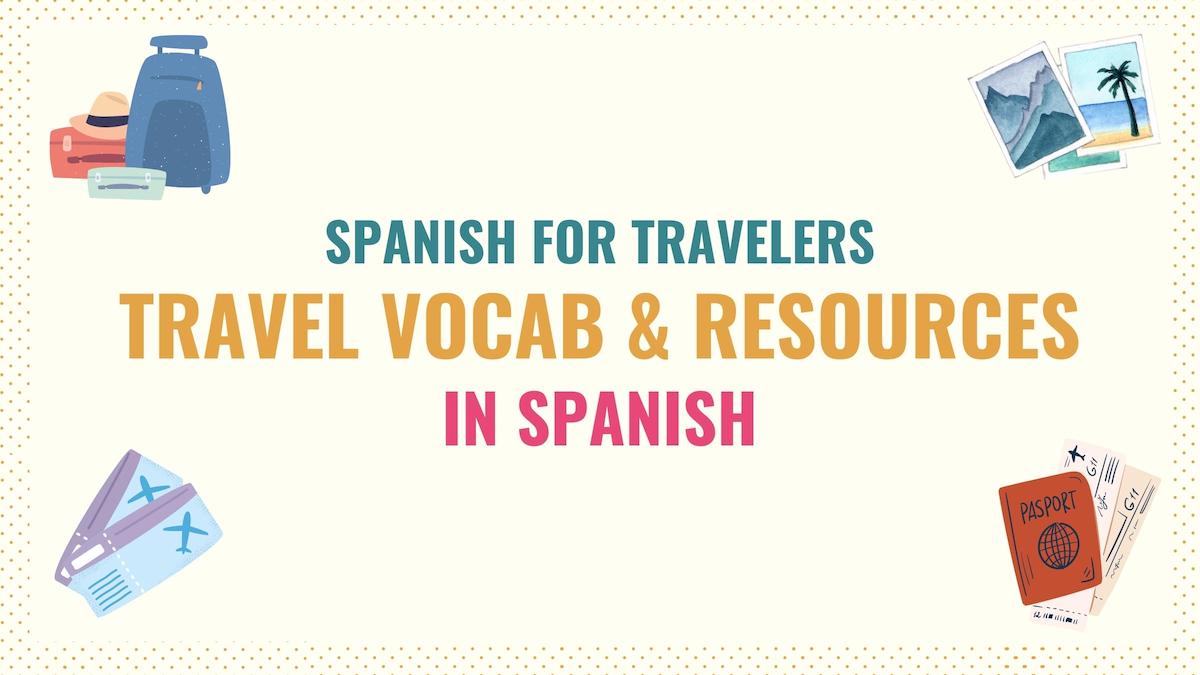
Viajar is the Spanish word for ‘travel’. If you’re planning a trip to a Spanish-speaking country, you should learn some basic expressions and words that can help you get along in different situations.
On this page, I’ve gathered some of our best resources to make your travels easier and more enjoyable. From essential travel phrases to ordering food and drinks, these guides are designed to make your interactions with locals easy and stress free.
Let’s jump right in!
- 91 Top Spanish Travel Phrases & Words for Tourists : Get familiar with these essential Spanish phrases to navigate different situations you may encounter in your trips. From being at the airport to shopping and more. I’ve seen courses where people pay for the exact same information in this guide. Save that for your trip and read this instead!
- How to Ask for & Reserve a Hotel Room in Spanish : Check this guide to learn expressions and vocabulary related to hotel accommodations. Everything travelers need to book a hotel room from the Spanish phrases to use to reserve a room to talking about dates and more.
- The Ultimate Guide on How to Order Food : If you’re traveling to Spain or a Spanish-speaking country in Latin America, you’re likely to try the local food. In this guide, you’ll find the key Spanish phrases, questions and words you need to order dishes at restaurants you visit while you travel.
- A Vegetarian and Vegan’s Guide to Ordering Food : This guide will give you the Spanish vocabulary you need to help you navigate menus and order delicious vegetarian and vegan meals with confidence. It includes the specific words you’ll need to ask if dishes adhere to your diet.
- The Complete Guide on Ordering and Asking for Drinks in Spanish : Enjoy your favorite beverages and connect with locals using this step-by-step guide on ordering and inquiring about drinks in Spanish.

Additional Spanish Resources to Speak When Traveling
The guides listed above are enough to help you communicate during your trips. If you want to take your conversational skills further, you can also learn some common greetings in Spanish . Also, adding some basic nouns and essential verbs to your vocabulary can help you express your ideas more effectively.
¡Buen viaje!
Daniela Sanchez
¡Hola! Soy Daniela Sanchez, I've been studying Spanish professionally as well as teaching it in Mexico and online for over 10 years. I’ve taught Spanish to a wide array of foreigners from many backgrounds. Over the years, I've made it my mission to work hard on refining many challenging to understand grammar topics to make my students' learning experiences easier, faster and more enjoyable. Read More About Me
Recent Posts
Verbs Like Gustar in Spanish: Conjugations + Must-Know List
Gustar and verbs like gustar convey the feelings and emotions that the subject provokes on someone or something. Their key differentiator is that they inverse the sentence order. Unlike most...
Muy vs Mucho: Key Differences Explained (+ Examples)
Muy means ‘very’. It intensifies the qualities described by an adjective or another adverb. Mucho is the equivalent of ‘a lot’ or ‘very much’, and it conveys the intensity or degree of an...
Pin It on Pinterest
Spanish Vocabulary Lists by Topic
Today, we’re talking about la vida , la familia , el trabajo , la cocina… that’s right, Spanish vocabulary! Learning essential vocab is a key step if you want to learn to speak Spanish fast . So, whether you’re on vacation, in a business meeting, or even having an emergency in a Spanish-speaking city, you’ll be covered if you’ve memorized the core words and phrases below. These Spanish vocabulary lists organized by topic feature common Spanish words and expressions you’ll encounter daily. At the end of the article, you can use our free Spanish language quiz to test yourself!
Last Updated: 16/04/2023
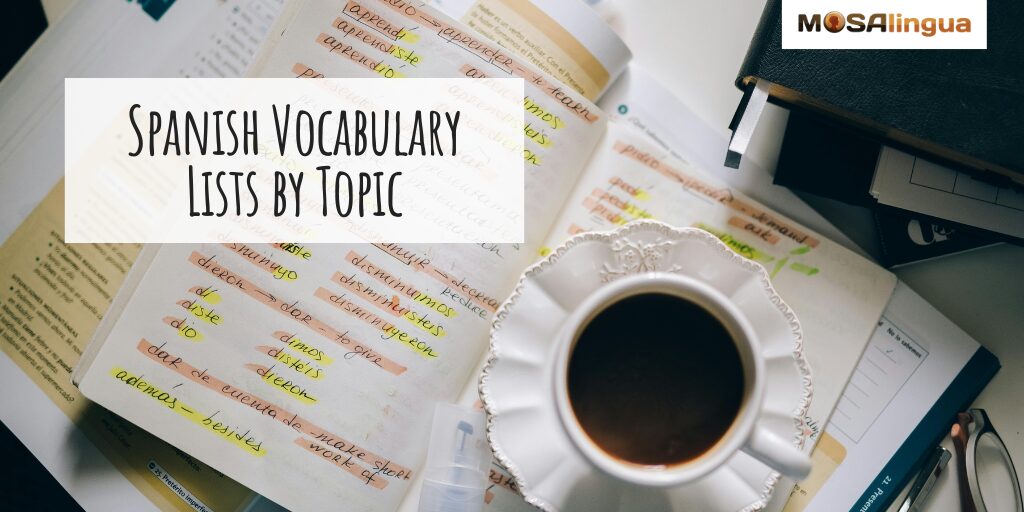
Need a Spanish vocabulary cheat sheet?
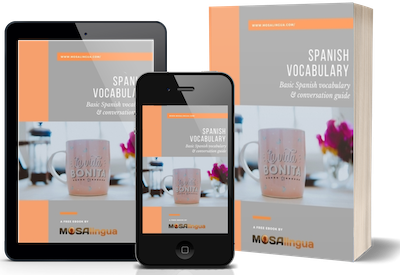
Learn Spanish vocabulary
13 spanish vocabulary lists, by topic & level.
To help you find the most appropriate vocabulary for your needs, we’ve organized some essential Spanish vocabulary by topic .
These lists include the 100 most common Spanish words and phrases, so you should learn them all sooner or later. However, if you want to learn something specific, use the search feature (⌘+F on Mac or Ctrl+F on Windows) and enter either an English or Spanish word.
Table of contents
Your first conversation, basic spanish vocabulary: food and drinks, intermediate spanish vocabulary: dates and times, in case of emergency…, moods and emotions, useful adjectives, useful verbs, why should i learn spanish vocabulary lists by topic, how can i learn spanish words more easily, is it possible to make learning spanish words fun, spanish vocabulary quiz, basic spanish vocabulary.

FYI, this list contains the most basic Spanish vocabulary . Your top priorities are this first list, plus the ones on manners and conversations. They contain 50 basic Spanish words and phrases, the most common and useful vocabulary that you can start communicating with right away. They’re the bare minimum, the most important Spanish words to know if you’re traveling to a Spanish-speaking country or want to talk to a Spanish language partner.
- Hello — Buenos días
- Good evening — Buenas tardes
- Good night — Buenas noches
Here, the terms días , tardes and noches are in plural form. In certain Latin American countries and even some places in Spain, it’s common to use the more familiar term and simply say, “ Buenas. ”
- Hi — Hola
- How’s it going? — ¿Cómo está? (formal) or ¿Qué tal?, ¿Cómo estás? (informal)
- Very well, thank you — Muy bien, gracias
- What’s your name? — ¿Cómo te llamas?
- My name is … — Me llamo …
- Goodbye — Adiós or Chau (informal)
- See you soon — Hasta pronto
- See you later — Hasta luego
- Yes — S í
- No — No
- I don’t know — No sé
We have a whole article dedicated to Spanish greetings and goodbyes , so check it out if you want to spice up your vocabulary!

Even if you don’t know much Spanish, people are much more likely to be nice to you and help you out if you are polite to them!
- Please — Por favor
- Thank you — Gracias
- You’re welcome / no problem — De nada
- Pleased to meet you — Mucho gusto
- Excuse me, pardon me — Disculpe, Perdón
- Don’t worry about it / it doesn’t matter / no worries — No importa, No te preocupes
- Good luck — Buena suerte
- Excuse me please (used to pass someone) — Permiso, Con permiso (para pasar)
- Please sit down — Siéntese, por favor (formal), Siéntate, por favor (informal)
- I agree — Estoy de acuerdo
- It’s good — Está bien, está bueno
- I am very sorry! / I’m so sorry! — ¡Lo siento mucho!

If we were to give you all the vocabulary you might need for a conversation, we might as well give you a dictionary! So, once again, we’ve only selected the most important Spanish words and phrases , the vocab you’ll need for most basic conversations when you’re just starting to learn the language. This Spanish vocabulary list will also help you avoid misunderstandings, comprehend what’s being said to you, and make sure others understand you .
- I am English / American — Soy inglés(a) / americano(a)
- I don’t understand — No entiendo
- Do you understand me? — ¿Me entiende? (usted, formal address)
- Is there someone who speaks English here? — ¿Hay alguien que hable inglés?
- How do you say … in Spanish? — ¿Cómo se dice … en español?
- What do you call this? — ¿Cómo se llama esto?
- What does … mean? — ¿Qué significa … ?
- Could you speak slower, please? — Más despacio, por favor
- I don’t speak Spanish (very well) — No hablo (muy bien) español
- I speak (a bit of) Spanish — Hablo un poco de español
- You misunderstood me — No me has entendido bien
- Could you repeat that please? — ¿Puedes repetirlo, por favor?
- I’m learning Spanish at the moment — Estoy aprendiendo español
You might want to practice these with a Spanish-speaking conversation partner before you try them out “live.” Find out where and how to meet conversation partners to practice your Spanish with.
Start improving your Spanish today
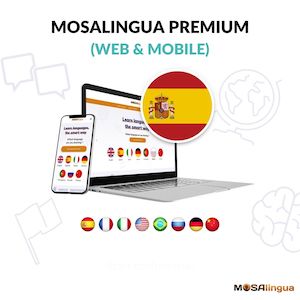
Good news: we can help! More good news: you can get started for free! With your free trial , you can test drive the most effective method for learning Spanish for the next 15 days !
Vocabulary flashcards, videos with subtitles, audiobooks, articles adapted to your level – with MosaLingua Premium (Web & Mobile) , you’ll have access to all this and more. Get started right now. It’s free—and risk-free—to try!
Try MosaLingua Premium today

These Spanish words about family will be particularly useful if you’re a beginner. Family is very important in Hispanic and Latino culture, so it’s good to know how to talk about family in Spanish.
- family — la familia
- parents — los padres
- mother — la madre
- father — el padre
- child — el niño or la niña
- grandfather — el abuelo
- grandmother — la abuela
- daughter — la hija
- son — el hijo
- uncle — el tío
- aunt — la tía
- stepmother / stepfather — la madrastra / el padrastro
- mother-in-law / father-in-law — la suegra (madre del esposo o de la esposa) / el suegro (padre del esposo o de la esposa)
- brother — el hermano
- sister — la hermana
- cousin — la prima / el primo

This is just the tip of the iceberg lettuce… (sorry for the cringy attempt at a Spanish joke ). To learn the names of fruits, vegetables, condiments, and lots more, download the MosaLingua Learn Spanish app .
- food — la comida
- drinks — las bebidas
- vegetables — las verduras
- to cook — cocinar
- I’m hungry — Tengo hambre
- I’m thirsty — Tengo sed
- breakfast — el desayuno
- lunch — el almuerzo
- dinner — la cena
- What’s today’s special? — ¿Cuál es el plato del día?
- What would you like to eat? — ¿Qué le gustaría comer?
- Could I have the bill, please? — ¿Me puede traer la cuenta, por favor?
- It’s very good — Está muy sabroso(a)
- Enjoy (your meal)! — ¡Buen provecho!
- Cheers! — ¡Salud!
- sweet — dulce
- savory — salado(a)
Intermediate Spanish Vocabulary

- clothing — la prenda, la ropa
- shoes — los zapatos
- pants / trousers — el pantalón
- shirt / t-shirt — la camisa / la camiseta
- jacket — la chaqueta
- skirt — la falda
- sweater / jumper — el suéter
- dress — el vestido
Do any of those Spanish words seem hard to pronounce ? Download our free Guide to Spanish Pronunciation and learn everything you need to know about having a great Spanish accent!

Days of the week in Spanish
- Monday — lunes
- Tuesday — martes
- Wednesday — miércoles
- Thursday — jueves
- Friday — viernes
- Saturday — sábado
- Sunday — domingo
Months in Spanish
- January — enero
- February — febrero
- March — marzo
- April — abril
- May — mayo
- June — junio
- July — julio
- August — agosto
- September — septiembre
- October — octubre
- November — noviembre
- December — diciembre
Other time words in Spanish
- What time is it? — ¿Qué hora es?
- hour — la hora
- day — día
- a week — una semana
- a month — un mes
- a year — un año
- morning — la mañana
- afternoon — la tarde
- evening / night — la noche
- noon / midday — mediodía
- midnight — medianoche

- journey — viaje
- baggage — el equipaje
- departure / arrival — la salida/ la llegada
- ID papers / ID documents — los documentos de identidad
- plane tickets — los billetes de avión
- boarding pass / card — la tarjeta de embarque
- Where are you going? — ¿A dónde va?
- I’d like to reserve a room for two people — Me gustaría reservar una habitación para dos personas
- a budget / low-cost hotel — un hotel económico
- car — coche / carro
- driver’s license — el permiso de conducir
- to get gas / petrol — echar/poner gasolina
- Could you show me on the map? — ¿Me lo puede mostrar en el mapa?
- I’d like to go to… — Quiero ir a…
- I’m lost, could you help me please? — Estoy perdido(a), ¿me puede ayudar, por favor?
- Where are we? — ¿Dónde estamos?
For more Spanish travel vocabulary, I highly recommend downloading our free Spanish travel phrasebook . It lists basic Spanish vocabulary for travel including means of transportation (plane, car, bus, train, etc.), activities, and needs (reserving a room, taking a plane, etc). And just for fun, find out some cool things to do in Barcelona to motivate yourself to learn these Spanish words about travel!

This list is essential if you’re going to Spain or Latin America, whether it’s for a weekend trip or for a longer stay. I really hope you won’t need it, but keep this list of emergency Spanish vocabulary handy just in case!
- Help! / Help me! — ¡Socorro! ¡Ayúdeme!
- I need your help — Necesito su ayuda
- It’s an emergency — Es una emergencia
- I’ve lost my passport — He perdido el pasaporte
- Leave me alone — ¡Déjame en paz!
- There’s a fire! — ¡Hay un incendio!
- I need a doctor urgently — Necesito un médico urgentemente
- I am ill /sick — Estoy enfermo(a)
- medicine — el medicamento
- Where is the nearest pharmacy? — ¿Dónde está la farmacia más cercana?
- I’m going to the hospital — Voy al hospital
- headache — el dolor de cabeza
Advanced Spanish Vocabulary

- cover letter — carta de presentación
- CV / resume — e l CV or currículum
- business / firm / company — la firma, el negocio, la compañía
- boss — el jefe
- employee — el empleado
- to work — trabajar
- to go to work — ir al trabajo
- working hours — el horario de trabajo
- strategy — la estrategia
- freelancer / independent — el autónomo / trabajador por cuenta propia
If you’d like to learn more specific vocabulary about the world of business or learn professional Spanish, we also have a special Spanish for Business app . Click to learn more or to download it !

Here is a list of Spanish words to know so that you can tell people how you are feeling.
- happy / content — contento(a), feliz, alegre
- depressed — deprimido(a)
- worried — preocupado(a)
- excited — emocionado(a), excitado(a)
- calm / relaxed — tranquilo(a), calmado(a)
- anxious / nervous — nervioso(a)
Can’t find the exact word you need to express how you’re feeling? Check out this article all about Spanish emotions .

Make your conversations more specific with these common Spanish adjectives. For other useful descriptive words, read our article and video about colors in Spanish .
- new — nuevo(a)
- fast — rápido(a)
- closed — cerrado(a)
- open — abierto(a)
- hot — caliente
- cold — frío
- small — pequeño(a)
- clean — limpio(a)
- easy — fácil
- funny — divertido(a), gracioso(a)
- nice / kind — simpático, agradable
- red — rojo(a)
- blue — azul
- yellow — amarillo(a)

This list is by no means exhaustive! But it does include some of the most important and useful verbs in Spanish.
- to be — estar, ser
- to have — haber (verbo auxiliar), tener
Those two verbs are what we call “auxiliary verbs,” otherwise known as “helper verbs.” You’ll use them a ton, especially once you start learning tenses.
- to communicate — comunicar
Learn this list of verbs if you want to be able to communicate in Spanish!
- to live — vivir
- to improve — mejorar
That’s an important one for learners 😉
- to reach — alcanzar
- to refuse / reject — rechazar
Don’t get that one mixed up with “to reach” (alcanzar) even though they look similar!
- to pay — pagar
- to extend / spread — expandir(se)
That little (se) on the end means that the verb can be reflexive.
- to deny /refuse — negar
- to sneeze — estornudar
Spanish, like English, has some irregular verbs. Learn what they are and how to conjugate irregular verbs in Spanish in your MosaLingua app!
Organizing words by theme helps you group related words together to learn more words quickly and lets you pick and choose exactly what you learn.
For example, don’t bother learning professional vocab if you never plan to use Spanish for your work. You probably already know that at MosaLingua, we’re big believers in the Pareto Principle . We think you should learn the 20% of a language that is used in 80% of situations. So, you’ll only find the most common and useful Spanish words and phrases in these lists.
Browse through our lists of core Spanish vocabulary in the main menu above to find the topic you need, and with the click of a button, you’ll have all the Spanish words, phrases, sentences, and expressions you should know right at your fingertips. Then, all that’s left is to memorize them! Whether you’re a beginner, an intermediate learner, or have reached an advanced level, flashcards are a great tool for learning new words.
There’s no secret to learning this Spanish vocabulary , you just have to memorize it. It’s the only way to learn these words and expressions and commit them to your long-term memory .
That said, learning by heart does not necessarily mean boring work! You can totally make learning this basic Spanish vocabulary more fun, simply by associating it with activities you enjoy.
To begin, find a learning method that both targets your needs and appeals to you. We recommend giving our app for learning Spanish a try.
The advantage of our app is that you don’t have to spend hours studying to make rapid progress. Actually, just 5 to 10 minutes a day is enough to get a good start!
Our app sends you notifications when you need to review the vocabulary you have previously learned, so it’s easy to practice consistently.
Keep studying until you’ve committed the Spanish words you need to your long-term memory and always have it on the tip of your tongue.
Having a great Spanish dictionary also helps – we recommend using the online dictionary offered by the Real Academia Española.
As I said, studying vocab doesn’t have to be tedious. Integrate vocabulary practice into fun activities to help you learn it. Like what, you might ask?
- You can start by jotting down the Spanish vocabulary you learned today on Post-it notes. Then, stick them on all the objects at home or in your office that you want to know! The idea is to put them in visible spots so that you see them as often as possible. Don’t take them down until you can remember the words without giving it any thought!
- Another one of my favorite activities is to watch films, in Spanish of course . Pick out some Spanish movies on Netflix and enrich your vocabulary while also improving your listening comprehension skills – and having fun!
- Similarly, you can watch TV series in Spanish or listen to the radio , and get your ear used to the sounds of Spanish.
We grouped all of these fun activities and more into a guide to the best resources for learning and practicing Spanish . Check them out for more ideas and inspiration!
Think you’ve mastered these common Spanish words and phrases? Take our Spanish test for beginners to find out!
Now that you've read our vocab lists, it's time to test your Spanish vocabulary knowledge with this free Spanish language quiz! Find out how many of the Spanish words and expressions you remember. (No peeking!)
If you liked this article, go further:
- 5 Simple Ways to Memorize Vocabulary
- 10 Good Reasons to Learn Spanish
- 10 Everyday Spanish Phrases for Beginners
- From Head to Toe: All the Body Parts in Spanish to Know
Related posts:

Did you like this article?
Thanks in advance for rating this article, it will encourage the author to write more
One click won't cost you anything, but it would mean a lot to us:
Want to start improving your language skills today.
Sarah is a Ph.D. Researcher, Translator and Language Specialist from Manchester (United Kingdom). Alongside her studies and work activities, she has a strong passion for creative writing, film, travel and languages. She speaks: English, French and German
Comments (6)
Thanks for the test. It was good to see how much I understand. I don’t get to speak as much as I would like. I would progress a lot faster if I had the opportunity to do so. I really did enjoy the articles as well. You have a nice web page.
I found what I was looking for
I’m so glad it was helpful, Desire! If you haven’t already, be sure to download the free eBook we put together so that you’ll have everything you need at your fingertips. Abbe
Tourist’s Guide: Travel Spanish Vocabulary for Easy Trips

Whether hiking through Peru or wandering the streets of Barcelona, knowing a bit of Spanish can transform your trip. Equip yourself with useful Spanish travel phrases and view trips not just as an adventure but also as a language-learning experience. From greetings to vocabulary for dining out, shopping, and finding accommodations, discover the language essentials that can make your journey smoother and more enjoyable.
Why Master Essential Spanish Phrases for Travel?
Knowing essential phrases is invaluable for anyone venturing into Spanish-speaking countries. It’s not just about overcoming language barriers; it’s about enriching your travel experience.
Mastering basic greetings, directions, and phrases for dining or shopping can transform your interactions and foster a deeper connection with the local culture. It helps navigate various situations, from asking for recommendations to understanding menus and signs. Speaking even a little Spanish can enhance your safety, as you’re better equipped to handle emergencies or unexpected situations.
Locals often appreciate the effort to speak their language, leading to warmer welcomes and more authentic experiences. Beyond practicality, using Spanish phrases during travel is a stepping stone to language learning, which immerses you in real-world practice. This approach turns each trip into not just an exploration of places but also a journey of linguistic discovery.
Navigating Spanish Travel with Confidence: Basic Greetings
Every journey begins with a hello. Starting conversations is an easy way to build confidence while traveling. Mastering basic greetings, farewells, and courteous phrases can set positive interactions with locals and establish mutual respect. Let’s walk through some essential Spanish salutations:
- Hola [oˈla] – Hello
Hola, ¿cómo estás? (Hello, how are you?)
- Buenos días [ˈbwenos ˈdias] – Good morning
Buenos días, ¿puede ayudarme? (Good morning, can you help me?)
- Buenas tardes [ˈbwenas ˈtaɾðes] – Good afternoon
Buenas tardes, ¿dónde está el hotel? (Good afternoon, where is the hotel?)
- Buenas noches [ˈbwenas ˈnotʃes] – Good evening/night
Buenas noches, quisiera hacer una reserva. (Good evening, I would like to make a reservation.)
- Adiós [aˈðjos] – Goodbye
Adiós, ¡gracias por todo! (Goodbye, thanks for everything!)
- Por favor [poɾ faˈβoɾ] – Please
Un café, por favor. (A coffee, please.)
- Gracias [ˈɡɾasjas] – Thank you
Gracias por la ayuda. (Thank you for the help.)
- Disculpe [diskulˈpe] – Excuse me
Disculpe, ¿sabe dónde está la estación? (Excuse me, do you know where the station is?)
- Lo siento [lo ˈsjento] – I’m sorry
Lo siento, no entiendo. (I’m sorry, I don’t understand.)
These basic phrases are perfect for initiating and ending conversations. They aid in making polite requests as well as demonstrating gratitude or apologizing.
Spanish for Traveling: Phrases for Everyday Use
Knowing everyday expressions enhances your experience. Beyond basic greetings, being able to communicate simple yet practical thoughts and questions can make your journey smoother. Here’s a collection of handy Spanish travel phrases:
- ¿Dónde está el baño? [ˈdonde esˈta el ˈbaɲo] – Where is the bathroom?
Perdón, ¿dónde está el baño? (Excuse me, where is the bathroom?)
- ¿Cuánto cuesta esto? [ˈkwanto ˈkwesta ˈesto] – How much does this cost?
Me gusta este sombrero, ¿cuánto cuesta? (I like this hat, how much does it cost?)
- ¿Puede ayudarme? [ˈpweðe aʝuˈðarme] – Can you help me?
Estoy perdido, ¿puede ayudarme? (I’m lost, can you help me?)
- Necesito un taxi. [neˈsesito un ˈtaksi] – I need a taxi.
Necesito un taxi para ir al aeropuerto. (I need a taxi to go to the airport.)
- ¿A qué hora cierra? [a ke ˈora ˈsjera] – What time does it close?
¿A qué hora cierra el museo? (What time does the museum close?)
- No entiendo. [no enˈtjendo] – I don’t understand.
Habla muy rápido, no entiendo. (You speak very fast, I don’t understand.)
- ¿Habla inglés? [ˈaβla iŋˈgles] – Do you speak English?
Disculpe, ¿habla inglés? (Excuse me, do you speak English?)
Such expressions prove invaluable when navigating unfamiliar places or situations. They are useful in various scenarios, whether you’re shopping or need assistance.
Asking for Directions in Spanish
Knowing how to ask for directions is essential when traveling. It not only helps you navigate through unfamiliar places but also opens up opportunities for interaction with locals. Here are some key Spanish phrases for traveling that will help you find your way:
- ¿Dónde está...? [ˈdonde esˈta] – Where is...?
¿Dónde está la estación de tren? (Where is the train station?)
- ¿Cómo llego a...? [ˈkomo ˈʎeɣo a] – How do I get to...?
¿Cómo llego al museo? (How do I get to the museum?)
- ¿Está lejos? [esˈta ˈlexos] – Is it far?
¿Está lejos la playa? (Is the beach far?)
- ¿Puede mostrarme en el mapa? [ˈpweðe mosˈtrarme en el ˈmapa] – Can you show me on the map?
Perdí mi camino, ¿puede mostrarme en el mapa? (I lost my way, can you show me on the map?)
- ¿Hay una parada de autobús cerca? [aɪ una paˈɾaða ðe awˈtoβus ˈθeɾka] – Is there a bus stop nearby?
Necesito ir al centro, ¿hay una parada de autobús cerca? (I need to go downtown, is there a bus stop nearby?)
- ¿Cuál es el mejor camino para...? [ˈkwal es el ˈmexor kaˈmino paɾa] – What is the best way to...?
¿Cuál es el mejor camino para el zoológico? (What is the best way to the zoo?)
- ¿Esta calle lleva a...? [ˈesta ˈkaʎe ˈʎeba a] – Does this street go to...?
¿Esta calle lleva al parque? (Does this street go to the park?)
- Estoy perdido/a. [esˈtoʝ peɾˈdiðo/a] – I am lost.
Disculpe, estoy perdido, ¿me puede ayudar? (Excuse me, I am lost, can you help me?)
These expressions are crucial for finding your way around Spanish-speaking destinations. They facilitate your travel and demonstrate your interest in engaging with the local culture.
Eating Out, Shopping, and Accommodation Vocabulary in Spanish
When venturing into Spanish-speaking territories, dining out, shopping, and seeking accommodation present excellent opportunities to practice your linguistic skills. Navigate these situations confidently with the Spanish travel vocabulary below:
- Menú [meˈnu] – Menu
¿Podría ver el menú? (Could I see the menu?)
- Cuenta [ˈkwenta] – Bill/Check
La cuenta, por favor. (The check, please.)
- Mesero/a [meˈseɾo/a] – Waiter/Waitress
Mesera, ¿podría traer más agua? (Waitress, could you bring more water?)
- Plato [ˈplato] – Dish
¿Qué plato recomienda? (Which dish do you recommend?)
- Reservación [reseɾβaˈθjon] – Reservation
Quisiera hacer una reservación. (I would like to make a reservation.)
- Precio [ˈpɾeθjo] – Price
¿Cuál es el precio de esto? (What is the price of this?)
- Tienda [ˈtjenda] – Shop/Store
¿Dónde está la tienda más cercana? (Where is the nearest shop?)
- Rebaja [reˈbaxa] – Discount
¿Esto tiene rebaja? (Is this discounted?)
- Talla [ˈtaʎa] – Size (for clothing)
Necesito una talla más grande. (I need a larger size.)
- Habitación [aβitaˈθjon] – Room (hotel)
¿Tiene habitaciones libres? (Do you have any rooms available?)
- Recepción [resepsˈjon] – Reception
Voy a preguntar en recepción. (I’ll ask at the reception.)
- Tarjeta de crédito [taɾˈxeta ðe ˈkɾeðito] – Credit card
¿Aceptan tarjetas de crédito? (Do you accept credit cards?)
- Efectivo [efeˈktiβo] – Cash
Prefiero pagar en efectivo. (I prefer to pay in cash.)
- Descuento [desˈkwento] – Discount (in hotels or larger purchases)
¿Hay algún descuento por estancia prolongada? (Is there a discount for an extended stay?)
This travel vocabulary in Spanish streamlines your dining, shopping, and accommodation experiences. Whether ordering a delicious plate in a restaurant or hunting for bargains in quaint local shops, becoming adept at these phrases can make your interactions smooth.
Communicating in Spanish: Tips for a Hassle-Free Vacation
Communicating effectively in Spanish can enhance your vacation and make it more enjoyable. Here are some tips to help you make the most out of your trip:
- Learn phrases for traveling. Before your trip, familiarize yourself with key phrases and greetings. This preparation helps in day-to-day interactions and shows respect for the local culture.
- Use technology. Utilize language translation apps and online dictionaries. These tools can be invaluable when you’re stuck or need to understand something quickly.
- Speak slowly and clearly. When speaking Spanish, take it slow. Clear pronunciation can aid in better understanding, especially if you’re not fluent.
- Practice active listening. Pay attention to the context and body language of speakers. Sometimes, non-verbal cues can help you grasp the meaning, even if you don’t understand every word.
- Ask for clarification. If you don’t understand something, don’t hesitate to ask the interlocutor to repeat or speak more slowly.
- Use gestures when necessary. If you’re struggling to find the right words, sometimes gestures or pointing can effectively communicate your message.
By following these tips, you can navigate Spanish-speaking countries with greater confidence. Remember, the goal is to enjoy the experience of learning and communicating in a new language, which can add a new dimension to your travels.
Master a New Language with Promova
Are you striving to learn a new language, whether English, German, Spanish, Korean, Chinese, etc? Promova can make the process easier and more effective for you! Our platform accommodates learners at various stages with diverse preferences. Use our app or web platform to explore guided courses for all competency levels. These comprehensive materials will enable you to improve your vocabulary, grasp grammar rules, understand conversational nuances, and test your progress through interactive quizzes.
For those seeking personal attention in their English studies, Promova offers 1x1 lessons with seasoned tutors targeted toward your unique learning goals. Remember to take advantage of our free trial lesson once you sign up! In addition to this, group sessions in English are also available. By interacting with peers, you can practice the tongue in a real-world context and gain confidence.
Expand your knowledge beyond structured lessons by browsing through articles on our blog. From the complete lists of Spanish sayings and phrases to the pronunciation guide for Chinese, our blog has resources that support your language learning journey. Also, join our Conversation Club for free weekly discussions on various topics. These sessions are designed to cultivate conversational English skills in a relaxed, interactive setting.
Embracing Spanish for travelers is an enriching endeavor. A little effort in learning key phrases opens doors to more meaningful interactions and deeper connections with the places you visit. Remember, effective communication is not just about fluency; it’s about the willingness to engage, the patience to listen, and the confidence to express yourself. Whether ordering a meal, asking for directions, or simply exchanging greetings, each interaction is a step towards a more immersive adventure.
Are there significant differences in Spanish across different countries?
The language varies by region regarding accent, vocabulary, and sometimes grammar. For example, European Spanish differs from Latin American Spanish in pronunciation and certain word usage. It’s helpful to learn some local variations or slang of the specific country you’re visiting.
What are some tips for quickly learning Spanish before a trip?
Focus on practical, conversational language instead of Spanish slang or jargon. Learn basic greetings, common questions, and phrases in daily activities like dining or shopping. Listening to music or podcasts can also aid in getting used to the rhythm and sound of the language.
How can I practice Spanish effectively while traveling?
Take every opportunity to speak with locals. Order food, ask for directions, or make purchases in Spanish. Don’t worry about making mistakes; real-world practice is one of the best ways to improve.
Where can I learn more Spanish phrases for travel?
If you want to learn Spanish for travel, websites like Linguee and Collins Dictionary provide a vast range of phrases specific to travel. The Spanish language-learning app from Promova also includes handy travel phrases and vocabulary in its course material.
COMBI Courses
- Tutor Lessons

Learn Spanish Online
- Private Lessons
- Private Tutor Lessons
- Conversation Lessons
- Spanish for Kids
- Exam Preparation
- Corporate Training
- FREE Level 1 Course
- Level 2–24 Courses
- Resource Sheets
- Beginners Course
- E-Mail Mini Courses
- Learner Blog
- Interactive Games
take our level test to determine your current knowledge of Spanish :

Let's Speak Spanish
- Our Teachers
- 24 Level System To Spanish Fluency®
- Student Reviews

Meet Our Teachers

Spanish for Travel – Learn Essential Spanish Vocabulary and Short Phrases for Your Next Trip

This post includes:
- Spanish travel phrases cheat sheet as PDF download
- Audio to correct your pronunciation
- Exercises to practice, 3 infographics, 2 podcast episodes, and an explanation video
- A recommendation for the best travel apps to make the most of your trip to Spain
Table of Contents
Introduction.
1.1 Essential Spanish conversational phrases
- Means of transportation 2.1 At the airport 2.2 Baggage related phrases 2.3 Buying tickets 2.4 At the train or the bus station
- At the car rental 3.1 Types of cars 3.2 Prices 3.3 Car information 3.4 Returning the car and emergency situations 3.5 Useful verbs
At the restaurant
At the hotel.
- Basic Spanish directions 6.1 Asking for directions 6.2 Receiving directions
- Essential phrases in Spanish for emergencies
- The most commonly used verbs
- Best apps for traveling in Spain
Looking to spice up your Spanish skills? From must-know verbs for your travels to nifty phrases that’ll make locals swoon, we’ve got you covered.
With our helpful Spanish phrases and words , you’ll be like a linguistic chameleon, seamlessly blending in wherever you go. Whether you’re exploring the vibrant streets of Mexico, basking in the Spanish sun, or even just soaking up the lively atmosphere of Miami, these phrases will be your secret weapon.
Here’s the secret sauce: ¡practice makes perfecto! Use these words and phrases until they flow effortlessly from your tongue until ordering tapas feels as natural as breathing.
Let’s dive into our blog and unlock the language of adventure! ¡Vamos!
Essential Spanish Conversational Phrases
A big part of traveling abroad is meeting new people. It doesn’t matter where you meet them, it only matters what you say to them. To have a broader picture check out our blog post about Greetings, Common Phrases and Most Common Questions in Spanish . The blog post was prepared for you by our experienced Spanish teachers.
[mp3j track=”https://letsspeakspanish.com/wp-content/uploads/2021/11/audio-blogpost-travel-1.mp3″ title=”” ind=”n” volslider=”n” flow=”y”] Hola, ¿qué tal? – Hello, how are you?
[mp3j track=”https://letsspeakspanish.com/wp-content/uploads/2021/11/audio-blogpost-travel-2.mp3″ title=”” ind=”n” volslider=”n” flow=”y”] Estoy bien, gracias. – I’m fine, thank you.
[mp3j track=”https://letsspeakspanish.com/wp-content/uploads/2021/11/audio-travel-blog-3.mp3″ title=”” ind=”n” volslider=”n” flow=”y”] No estoy muy bien. / No estoy bien. – I’m not too well. / I’m not well.
[mp3j track=”https://letsspeakspanish.com/wp-content/uploads/2022/03/Spanish-travel-2.mp3″ title=”” ind=”n” volslider=”n” flow=”y”] Buenos días. Buenas tardes. Buenas noches. – Good morning. Good afternoon. Good evening./Good night.
[mp3j track=”https://letsspeakspanish.com/wp-content/uploads/2021/11/audio-travel-4.mp3″ title=”” ind=”n” volslider=”n” flow=”y”] Adiós. Buenas noches. – Goodbye. Good night.
[mp3j track=”https://letsspeakspanish.com/wp-content/uploads/2021/11/audio-travel-6.mp3″ title=”” ind=”n” volslider=”n” flow=”y”] ¿Hablas inglés? – Do you speak English?
[mp3j track=”https://letsspeakspanish.com/wp-content/uploads/2021/11/audio-travel-7.mp3″ title=”” ind=”n” volslider=”n” flow=”y”] ¿Puedes ayudarme? – Can you help me?
[mp3j track=”https://letsspeakspanish.com/wp-content/uploads/2021/11/audio-travel-8.mp3″ title=”” ind=”n” volslider=”n” flow=”y”] ¿Puedes hablar más despacio? No entiendo. – Can you speak slower? I don’t understand.
[mp3j track=”https://letsspeakspanish.com/wp-content/uploads/2021/11/audio-travel-9.mp3″ title=”” ind=”n” volslider=”n” flow=”y”] Hasta mañana. / Hasta luego. / Hasta pronto. – See you tomorrow. / See you later. / See you soon.
[mp3j track=”https://letsspeakspanish.com/wp-content/uploads/2023/06/Disculpa-perdona.mp3″ title=”” ind=”n” volslider=”n” flow=”y”] Disculpa/Perdona. Por favor. Gracias. De nada. – Excuse me. Please. Thank you. You’re welcome.
[mp3j track=”https://letsspeakspanish.com/wp-content/uploads/2021/11/audio-travel-11.mp3″ title=”” ind=”n” volslider=”n” flow=”y”] Sí, por favor. No, gracias. – Yes, please. No, thanks.
[mp3j track=”https://letsspeakspanish.com/wp-content/uploads/2023/06/¿Como-te-llamas_-Me-llamo.mp3″ title=”” ind=”n” volslider=”n” flow=”y”] ¿Cómo te llamas? Me llamo _____ – What’s your name? My name is _____
[mp3j track=”https://letsspeakspanish.com/wp-content/uploads/2023/06/¿Donde-vives_-Vivo-en-____.mp3″ title=”” ind=”n” volslider=”n” flow=”y”] ¿Dónde vives? Vivo en ____. – Where do you live? I live in ______.
[mp3j track=”https://letsspeakspanish.com/wp-content/uploads/2021/11/audio-ttravel-14.mp3″ title=”” ind=”n” volslider=”n” flow=”y”] Encantado de conocerte. ¿De dónde eres? – Nice to meet you. Where are you from?
[mp3j track=”https://letsspeakspanish.com/wp-content/uploads/2021/11/audio-travel-15.mp3″ title=”” ind=”n” volslider=”n” flow=”y”] Soy de _______. – I’m from _________.
[mp3j track=”https://letsspeakspanish.com/wp-content/uploads/2023/06/¿Cual-es-tu-profesion_-Soy-.mp3″ title=”” ind=”n” volslider=”n” flow=”y”] ¿Cuál es tu profesión? Soy ______. – What’s your job? I’m a(n) _______.
[mp3j track=”https://letsspeakspanish.com/wp-content/uploads/2021/11/audio-travel-17.mp3″ title=”” ind=”n” volslider=”n” flow=”y”] ¿Cuál es tu número de teléfono? Mi número de teléfono es _____ Llámame. Este es mi número de teléfono. – What’s your phone number? My phone number is… Call me. This is my phone number.
[mp3j track=”https://letsspeakspanish.com/wp-content/uploads/2023/06/correo-electronico.mp3″ title=”” ind=”n” volslider=”n” flow=”y”] ¿Cuál es tu dirección de correo electrónico? Mi dirección de correo electrónico es_____. Envíame un correo electrónico. Esta es mi dirección de correo electrónico. – What’s your email address? My email address is… Email me. Here’s my email address.
The first step of traveling is planning. It can be fun but also quite stressful. It’s up to you to decide. In our podcast we talk about planning vacations in Spanish. You can listen to it on different platforms!
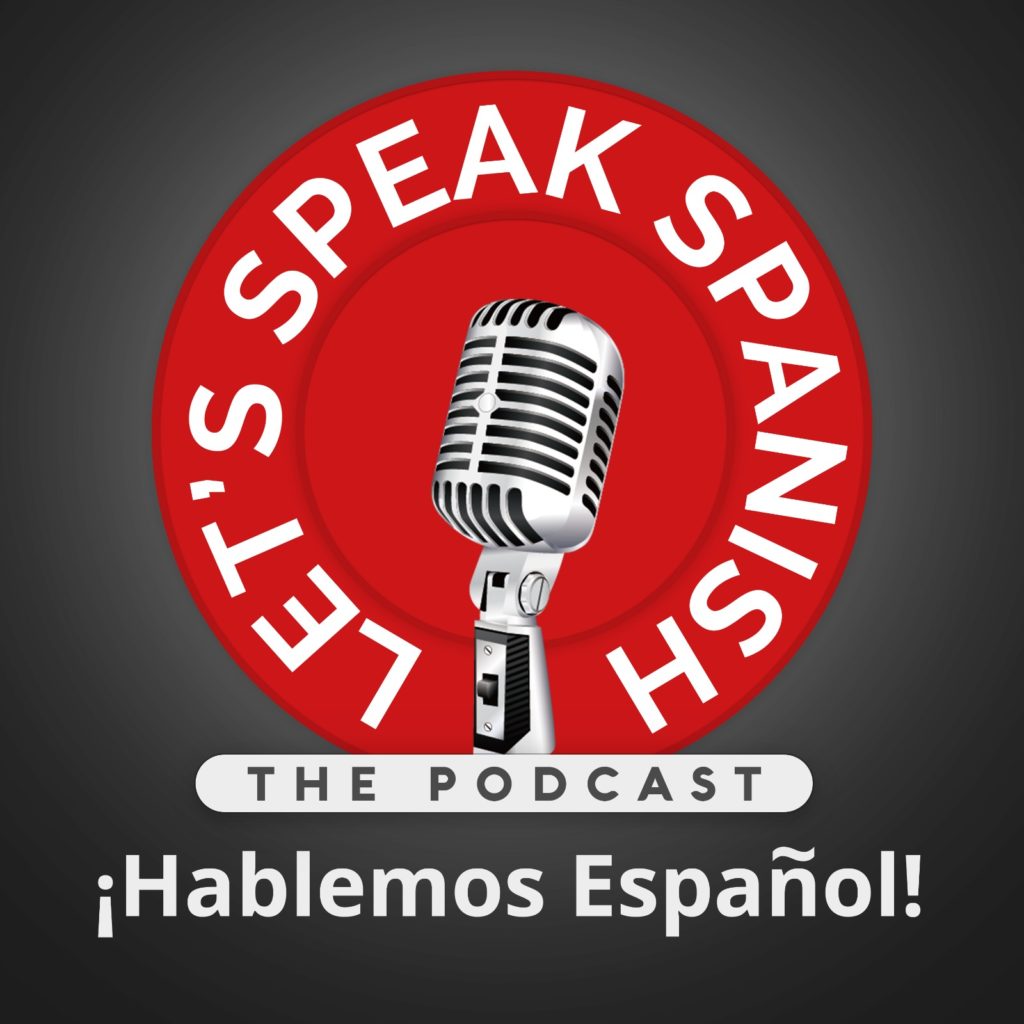
Planning Vacations in Spanish: Listen to Our Podcast!
Means of transportation.
First, we need to get started with the transport vocabulary . Have a look at the infographic you’ll find bellow.
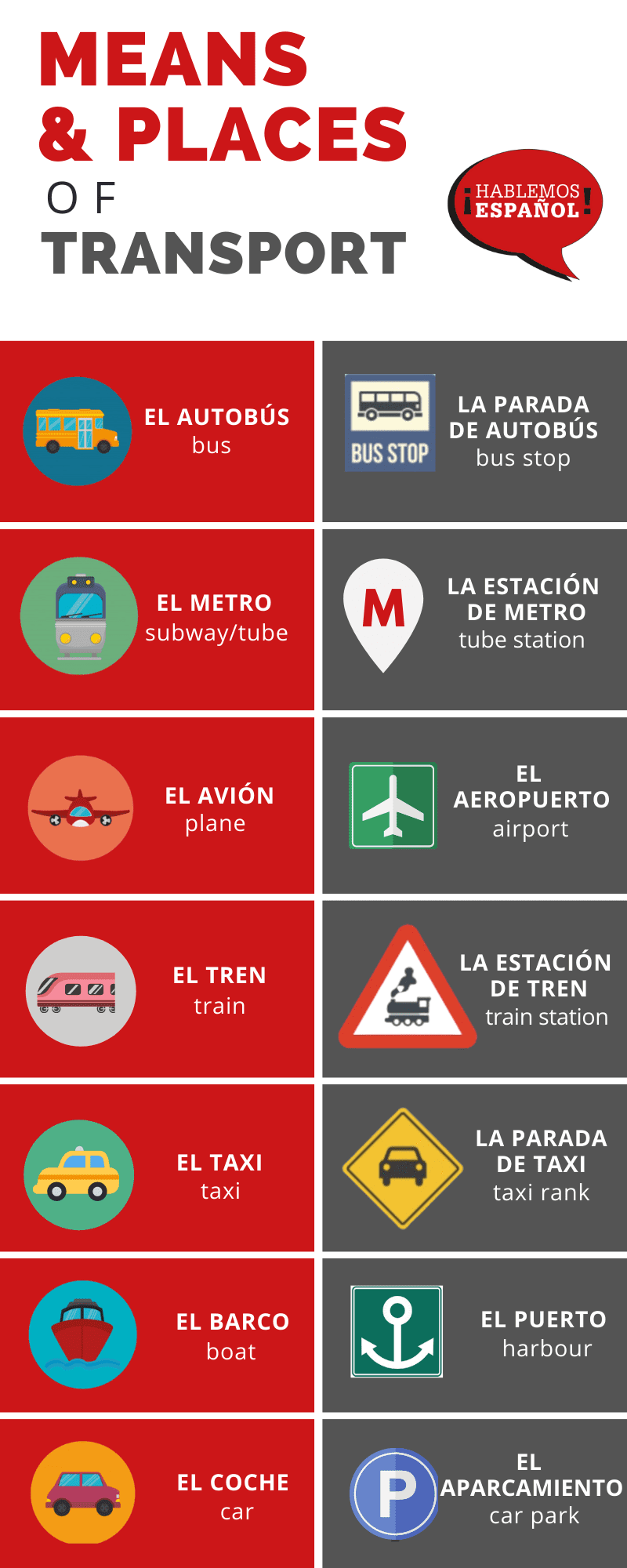
At the Airport
If you are taking your first flight to Spain , you should be prepared for all the different dialects and accents you will hear and see on your trip. To smooth your experience, we provide you with a list of common words and phrases used at the airport in Spanish .
[mp3j track=”https://letsspeakspanish.com/wp-content/uploads/2021/12/travel-airport-1.mp3″ title=”” ind=”n” volslider=”n” flow=”y”] ¿Dónde está el mostrador de facturación? – Where is the check-in counter?
[mp3j track=”https://letsspeakspanish.com/wp-content/uploads/2021/12/travel-airport-2.mp3″ title=”” ind=”n” volslider=”n” flow=”y”] ¿Dónde está el control de seguridad? – Where is the security checkpoint?
[mp3j track=”https://letsspeakspanish.com/wp-content/uploads/2021/12/travel-airport-3.mp3″ title=”” ind=”n” volslider=”n” flow=”y”] ¿Dónde está el autobús de enlace que lleva al hotel? – Where is the hotel shuttle bus?
[mp3j track=”https://letsspeakspanish.com/wp-content/uploads/2021/12/travel-airport-4.mp3″ title=”” ind=”n” volslider=”n” flow=”y”] ¿Dónde está la aduana? – Where are the customs?
[mp3j track=”https://letsspeakspanish.com/wp-content/uploads/2021/12/travel-airport-5.mp3″ title=”” ind=”n” volslider=”n” flow=”y”] ¿Dónde está la parada de autobús? – Where is the bus stop?
[mp3j track=”https://letsspeakspanish.com/wp-content/uploads/2021/12/travel-airport-6.mp3″ title=”” ind=”n” volslider=”n” flow=”y”] ¿Dónde está la terminal? – Where is the terminal?
[mp3j track=”https://letsspeakspanish.com/wp-content/uploads/2022/03/Travel-for-spanish-blog.mp3″ title=”” ind=”n” volslider=”n” flow=”y”] ¿Dónde está el baño/servicio/aseo ? – Where is the toilet?
[mp3j track=”https://letsspeakspanish.com/wp-content/uploads/2023/06/¿A-que-hora-sale-el-avion_.mp3″ title=”” ind=”n” volslider=”n” flow=”y”] ¿A qué hora sale el avión? – What time does the plane leave?
[mp3j track=”https://letsspeakspanish.com/wp-content/uploads/2021/12/travel-airport-9.mp3″ title=”” ind=”n” volslider=”n” flow=”y”] ¿A qué hora llega el vuelo? – What time does the flight arrive?
[mp3j track=”https://letsspeakspanish.com/wp-content/uploads/2021/12/travel-airport-10.mp3″ title=”” ind=”n” volslider=”n” flow=”y”] ¿Cuál es el número de vuelo? – What is the flight number?
[mp3j track=”https://letsspeakspanish.com/wp-content/uploads/2021/12/travel-airport-11.mp3″ title=”” ind=”n” volslider=”n” flow=”y”] ¿Cuál es el teléfono de la compañía aérea? – What is the airline’s phone number?
Baggage Related Phrases
Buying tickets.
Here you have some essential phrases and vocabulary to buy tickets in Spanish. We know how stressful is to purchase tickets for buses, trains, airplanes or any event that you want to attend. But don’t panic! We are here to make your life easier.
[mp3j track=”https://letsspeakspanish.com/wp-content/uploads/2023/06/¿Hablas-ingles_.mp3″ title=”” ind=”n” volslider=”n” flow=”y”] ¿Hablas inglés? – Do you speak English?
[mp3j track=”https://letsspeakspanish.com/wp-content/uploads/2021/12/travel-tickets-2.mp3″ title=”” ind=”n” volslider=”n” flow=”y”] ( Quería) un billete a Barcelona. – I want a ticket to Barcelona.
[mp3j track=”https://letsspeakspanish.com/wp-content/uploads/2021/12/travel-tickets-3.mp3″ title=”” ind=”n” volslider=”n” flow=”y”] Un billete de ida a Santiago, por favor. – One way ticket to Santiago, please.
[mp3j track=”https://letsspeakspanish.com/wp-content/uploads/2021/12/travel-tickets-4.mp3″ title=”” ind=”n” volslider=”n” flow=”y”] ¿Cuánto cuesta el billete? – How much does the ticket cost?
[mp3j track=”https://letsspeakspanish.com/wp-content/uploads/2021/12/travel-tickets-5.mp3″ title=”” ind=”n” volslider=”n” flow=”y”] ¿Cuándo sale el avión/autobús/tren? – When does the plane/bus/train leave?
[mp3j track=”https://letsspeakspanish.com/wp-content/uploads/2021/12/travel-tickets-6.mp3″ title=”” ind=”n” volslider=”n” flow=”y”] ¿Cuándo llega el avión/autobús/tren? – When does the plane/bus/train arrive?
At the Train or the Bus Station
[mp3j track=”https://letsspeakspanish.com/wp-content/uploads/2021/12/travel-at-train-1.mp3″ title=”” ind=”n” volslider=”n” flow=”y”] ¿Cuánto cuesta el billete? – How much does the ticket cost?
[mp3j track=”https://letsspeakspanish.com/wp-content/uploads/2021/12/travel-at-train-2.mp3″ title=”” ind=”n” volslider=”n” flow=”y”] Un billete de ida a Valencia, por favor. – One way ticket to Valencia, please.
[mp3j track=”https://letsspeakspanish.com/wp-content/uploads/2021/12/travel-at-train-3.mp3″ title=”” ind=”n” volslider=”n” flow=”y”] ¿A qué hora sale el tren para ___? – What time does the train to … leave?
[mp3j track=”https://letsspeakspanish.com/wp-content/uploads/2021/12/travel-at-train-4.mp3″ title=”” ind=”n” volslider=”n” flow=”y”] ¿Dónde está la parada del autobús número 11? – Where is the stop for bus number 11?
[mp3j track=”https://letsspeakspanish.com/wp-content/uploads/2021/12/travel-at-train-5.mp3″ title=”” ind=”n” volslider=”n” flow=”y”] ¿Cuándo llega el tren de ____? – When does the train from … arrive?
[mp3j track=”https://letsspeakspanish.com/wp-content/uploads/2021/12/travel-at-train-6.mp3″ title=”” ind=”n” volslider=”n” flow=”y”] ¿Cuál es la próxima parada? – What is the next stop?
[mp3j track=”https://letsspeakspanish.com/wp-content/uploads/2021/12/travel-at-train-7.mp3″ title=”” ind=”n” volslider=”n” flow=”y”] ¿Cuántas paradas más hay hasta ____? – How many more stops until…?
[mp3j track=”https://letsspeakspanish.com/wp-content/uploads/2021/12/travel-at-train-8.mp3″ title=”” ind=”n” volslider=”n” flow=”y”] ¿Cuánto dura el viaje? – How long is the journey?
While traveling in Spanish-speaking countries it’s necessary to know the numbers and dates . Even if you know how to ask “ How much does it cost? ” – it doesn’t mean that you will understand the answer (yes, I’ve been there).
For this reason, we have created a complete post for Numbers in Spanish . If you have difficulties with long numbers or find yourself frustrated with 5, 15, 50, and 500, then you should definitely check it out.
At the Car Rental
- Client : Buenos días. Quiero alquilar un coche. - Good afternoon. I would like to rent a car.
- Renter : Hola. ¿Tiene una reserva? - Do you have a reservation?
- Client : Sí/no tengo una reserva. - Yes, I have/No, I don’t have a reservation
- Renter : ¿Para cuántos días / cuántas semanas? - For how many days/weeks?
- Client : Para ____ días/semanas. - For ____ days/weeks.
Did you know that the word ‘car’ in Spanish can be said in many different ways depending on the country you’re in? Here you have a few examples.
Types of Cars:
Car information:.
[mp3j track=”https://letsspeakspanish.com/wp-content/uploads/2021/12/travel-at-car-4.mp3″ title=”” ind=”n” volslider=”n” flow=”y” ¿El coche es manual o automático? – Is the car manual or automatic?
[mp3j track=”https://letsspeakspanish.com/wp-content/uploads/2023/06/¿El-coche-tiene-aire-acondicionado_.mp3″ title=”” ind=”n” volslider=”n” flow=”y”] ¿El coche tiene aire acondicionado? – Does the car have air conditioning?
[mp3j track=”https://letsspeakspanish.com/wp-content/uploads/2021/12/travel-at-car-6.mp3″ title=”” ind=”n” volslider=”n” flow=”y”] ¿Dónde está la rueda de repuesto? – Where is the spare tire?
[mp3j track=”https://letsspeakspanish.com/wp-content/uploads/2021/12/travel-at-car-7.mp3″ title=”” ind=”n” volslider=”n” flow=”y”] ¿Qué tipo de gasolina utiliza? – What kind of fuel does it take?
[mp3j track=”https://letsspeakspanish.com/wp-content/uploads/2023/06/¿Cuantos-litros-por-kilometro-consume-este-coche_.mp3″ title=”” ind=”n” volslider=”n” flow=”y”] ¿Cuántos litros por kilómetro consume este coche? – How many miles/kilometers does this car get to the gallon/liter.
[mp3j track=”https://letsspeakspanish.com/wp-content/uploads/2023/06/¿El-precio-incluye-el-seguro-y-el-kilometraje_.mp3″ title=”” ind=”n” volslider=”n” flow=”y”] ¿ El precio incluye el seguro y el kilometraje? – Does that price include insurance and mileage?
Returning the Car and Emergency Situations:
[mp3j track=”https://letsspeakspanish.com/wp-content/uploads/2023/06/devolver-el-coche.mp3″ title=”” ind=”n” volslider=”n” flow=”y”] ¿Dónde y cuándo tengo que devolver el coche? – Where and when do I have to return the car.
[mp3j track=”https://letsspeakspanish.com/wp-content/uploads/2023/06/devolver-el-coche-con-el-deposito-lleno.mp3″ title=”” ind=”n” volslider=”n” flow=”y”] ¿Tengo que devolver el coche con el depósito lleno? – Do I have to return the car with a full gas tank?
[mp3j track=”https://letsspeakspanish.com/wp-content/uploads/2023/06/llamar-en-caso-de-accidente-o-averia.mp3″ title=”” ind=”n” volslider=”n” flow=”y”] ¿A qué número tengo que llamar en caso de accidente o avería? – Is there anyone I can call in case of accident or breakdown
Useful Verbs:
Do you know how to order in a restaurant in Spanish? What would you say if the waiter only spoke Spanish? Or if he did not understand your language or was rude? Usually the waiters (camareros) don’t speak English or they don’t speak the language very well. So, we advise you to take a closer look at the Basic Spanish Vocabulary for Restaurants . There you will find basic and important vocabulary.
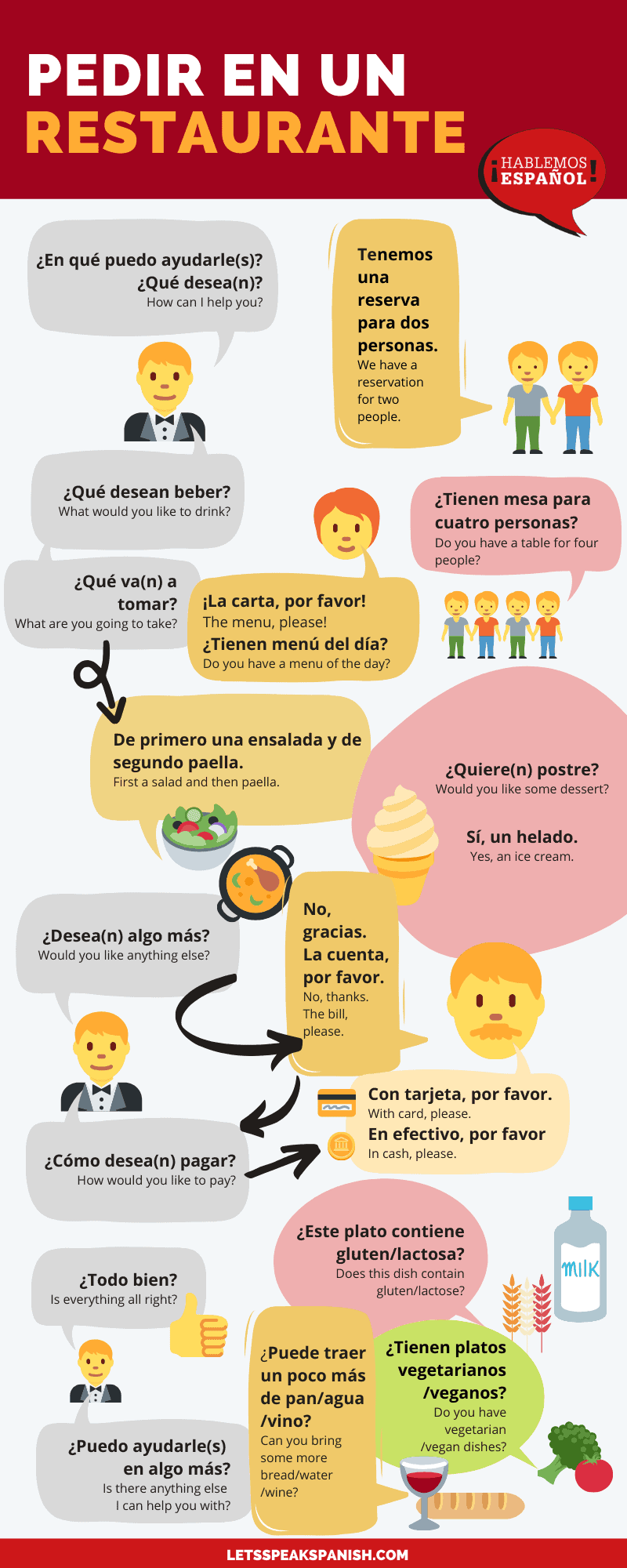
If you want to book your accommodation the old fashioned way, with a phone conversation, you can use these phrases. Keep in mind that you can write down all your requests in the reservation form on the hotel’s website.
Here you will find useful phrases for booking a room in Spanish .
The phrases you might use while checking-in :
[mp3j track=”https://letsspeakspanish.com/wp-content/uploads/2022/03/Hotel-1.mp3″ title=”” ind=”n” volslider=”n” flow=”y”] Hola, tengo una habitación reservada. – Hi, I have a reserved room.
[mp3j track=”https://letsspeakspanish.com/wp-content/uploads/2022/03/Hotel-2.mp3″ title=”” ind=”n” volslider=”n” flow=”y”] Me gustaría hacer el check-in. – I’d like to do the check-in.
[mp3j track=”https://letsspeakspanish.com/wp-content/uploads/2022/03/Hotel-3.mp3″ title=”” ind=”n” volslider=”n” flow=”y”] ¿Está lista la habitación? – Is the room ready?
[mp3j track=”https://letsspeakspanish.com/wp-content/uploads/2022/03/Hotel-4.mp3″ title=”” ind=”n” volslider=”n” flow=”y”] ¿Dónde puedo dejar mis maletas? – Where can I leave my luggage?
[mp3j track=”https://letsspeakspanish.com/wp-content/uploads/2022/03/Hotel-5.mp3″ title=”” ind=”n” volslider=”n” flow=”y”] ¿Dónde puedo aparcar el coche? – Where can I park my car?
[mp3j track=”https://letsspeakspanish.com/wp-content/uploads/2022/03/Hotel-6-2.mp3″ title=”” ind=”n” volslider=”n” flow=”y”] ¿En qué planta/piso está la habitación? – On which floor is the room?
[mp3j track=”https://letsspeakspanish.com/wp-content/uploads/2022/03/Hotel-7.mp3″ title=”” ind=”n” volslider=”n” flow=”y”] ¿A qué hora es el desayuno? – What time is breakfast?
[mp3j track=”https://letsspeakspanish.com/wp-content/uploads/2022/03/Hotel-8.mp3″ title=”” ind=”n” volslider=”n” flow=”y”] ¿Cuál es el horario de la piscina? – What are the swimming pool hours?
[mp3j track=”https://letsspeakspanish.com/wp-content/uploads/2023/06/Quiero-pagar-la-habitacion.mp3″ title=”” ind=”n” volslider=”n” flow=”y”] Quiero pagar la habitación. – I’d like to do the payment for the room.
[mp3j track=”https://letsspeakspanish.com/wp-content/uploads/2022/03/Hotel-10.mp3″ title=”” ind=”n” volslider=”n” flow=”y”] ¿Puedo pagar con tarjeta? – Can I pay by card?
[mp3j track=”https://letsspeakspanish.com/wp-content/uploads/2022/03/spanish-efectivo.mp3″ title=”” ind=”n” volslider=”n” flow=”y”] ¿Puedo pagar en efectivo? – Can I pay in cash?
[mp3j track=”https://letsspeakspanish.com/wp-content/uploads/2022/03/Hotel-12.mp3″ title=”” ind=”n” volslider=”n” flow=”y”] ¿Puede llamar un taxi, por favor? – Can you please call me a taxi?
For booking a hotel room, describing a place or an object in Spanish, we created a podcast episode that you can listen to and enhance your vocabulary and grammar skills.
On Vacation in Spain: Listen to Our Podcast!
Basic spanish directions.
This section will help you navigate through the streets of Mexico City, Barcelona or a little village of Peru.
Check out our detailed blog post about Useful Spanish Directions!

Asking for directions:
[mp3j track=”https://letsspeakspanish.com/wp-content/uploads/2023/06/Disculpa_Perdona-¿la-plaza-Mayor_.mp3″ title=”” ind=”n” volslider=”n” flow=”y”] Disculpa/Perdona, ¿la plaza Mayor?
[mp3j track=”https://letsspeakspanish.com/wp-content/uploads/2023/06/Busco-la-estacion-de-metro-mas-cercana.mp3″ title=”” ind=”n” volslider=”n” flow=”y”] Busco la estación de metro más cercana. – I’m looking for the closest metro station.
[mp3j track=”https://letsspeakspanish.com/wp-content/uploads/2022/03/Directions-3-2.mp3″ title=”” ind=”n” volslider=”n” flow=”y”] Estoy buscando un cajero automático. – I’m looking for an ATM.
[mp3j track=”https://letsspeakspanish.com/wp-content/uploads/2022/03/Directions-4-2.mp3″ title=”” ind=”n” volslider=”n” flow=”y”] ¿Dónde está el Museo de Arte Moderno? – Where is the Museum of Modern Art?
[mp3j track=”https://letsspeakspanish.com/wp-content/uploads/2022/03/Directions-5-.mp3″ title=”” ind=”n” volslider=”n” flow=”y”] ¿Hay un hospital cerca de aquí/por aquí cerca? – Is there a hospital around here?
Receiving directions:

Remember! If you don’t understand something, ask the person to repeat: ¿Cómo? (How?) . Usually Spanish people speak fast so you might need to slow them down a bit – just say: ¡Despacio, por favor! Slowly, please!
Essential Phrases in Spanish for Emergencies
Hopefully, you won’t need this part of our blog post, but it’s important that you know some basic phrases in case you need help!
[mp3j track=”https://letsspeakspanish.com/wp-content/uploads/2022/03/Emergencies-1.mp3″ title=”” ind=”n” volslider=”n” flow=”y”] ¿Puedes ayudarme? – Can you help me?
[mp3j track=”https://letsspeakspanish.com/wp-content/uploads/2022/03/Emergencies-2.mp3″ title=”” ind=”n” volslider=”n” flow=”y”] Necesito ayuda . – I need help.
[mp3j track=”https://letsspeakspanish.com/wp-content/uploads/2022/03/Emergencies-3.mp3″ title=”” ind=”n” volslider=”n” flow=”y”] Estoy perdido . – I’m lost.
[mp3j track=”https://letsspeakspanish.com/wp-content/uploads/2023/06/¡Llama-a-la-policia-.mp3″ title=”” ind=”n” volslider=”n” flow=”y”] ¡Llama a la policía! – Call the police!
[mp3j track=”https://letsspeakspanish.com/wp-content/uploads/2023/06/¡Llama-a-una-ambulancia.mp3″ title=”” ind=”n” volslider=”n” flow=”y”] ¡Llama a una ambulancia! – Call an ambulance!
[mp3j track=”https://letsspeakspanish.com/wp-content/uploads/2022/03/Emergencies-6.mp3″ title=”” ind=”n” volslider=”n” flow=”y”] ¡Ten cuidado! – Be careful!
[mp3j track=”https://letsspeakspanish.com/wp-content/uploads/2022/03/Emergencies-7.mp3″ title=”” ind=”n” volslider=”n” flow=”y”] Ha habido un accidente. – There’s been an accident.
[mp3j track=”https://letsspeakspanish.com/wp-content/uploads/2023/06/¡Por-favor-rapido.mp3″ title=”” ind=”n” volslider=”n” flow=”y”] ¡Por favor, rápido! – Please hurry!
[mp3j track=”https://letsspeakspanish.com/wp-content/uploads/2022/03/Emergencies-9.mp3″ title=”” ind=”n” volslider=”n” flow=”y”] ¿Estás bien? – Are you OK?
[mp3j track=”https://letsspeakspanish.com/wp-content/uploads/2022/03/Emergencies-10.mp3″ title=”” ind=”n” volslider=”n” flow=”y”] Me han robado. – I’ve been robbed.
[mp3j track=”https://letsspeakspanish.com/wp-content/uploads/2022/03/Emergencies-11-.mp3″ title=”” ind=”n” volslider=”n” flow=”y”] Me han atacado. – I’ve been attacked.
The Most Commonly Used Verbs
In this part you can refresh or learn new Spanish verbs for traveling .
Best Apps for Traveling in Spain

1. Maps.me – a perfect alternative to any online maps. Before going to your destination, download an offline map and you will never get lost. You can also search for restaurants, supermarkets, and cultural landmarks without being connected to the internet.

2. Cabify – it’s like Uber but a Spanish version.

3. Triposo – a different kind of a TripAdvisor. It’s more user friendly and it has a lot of information about any destination. Create bucket lists and add favorite places. You can also find mini-guides gathered by the community.

4. Spanish Dict – although Google Translate is an excellent tool, we suggest this app for traveling through Spanish-speaking countries.

5. El Tenedor (The Fork) – the app has information about over 30,000 restaurants in Spain. You can discover what is around your location, choose the preferred cuisine and book a table. You can see the full menu in an app, which is handy. The app also offers discounts and some great deals.

6. Idealista – website and app for finding accommodation for longer periods. It offers apartments and houses to rent or buy.

7. Wallapop – similar to eBay, but in Spain. You can sell or buy stuff through the website or the app.
We hope this blog post answered many of your questions. Now, you’re ready for your adventure in Spain or South America. If you’re interested in more educational blog posts, visit our Learner’s Blog or check the FREE options to learn Spanish.

Would you like to take your Spanish to the next level?
Whether you’re a complete beginner or you’re an advanced student, with us you’ll reach the next level of Spanish quickly and easily. With 24 Levels to Spanish fluency, the next level is always close by, so you will never lose motivation.
You can choose between:
COMBI Spanish Self-Study Course
Live lesson with one of our tutors.
In both cases, you’ll learn Spanish using our successful 24 Level System to Spanish Fluency® and our unique Spanish teaching methods.
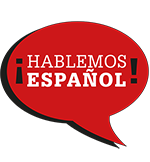
[email protected]
- 24 Level System to Spanish Fluency®
- Pricing & Booking
- Spanish Test
- COMBI Course

© 2024 FU International Academy
- Privacy Policy
- Terms and Conditions
- Legal Notice
Illustration by Natasha Remarchuk de Icons8

- Conversational Spanish
- Level 2-24 Courses
- Email Mini Courses
- Wall of Love
- More Networks
- +323-638-9787
- Make a Payment

Nadia Dardon
A comprehensive guide to travel vocabulary in spanish.
- June 6, 2023
- A1 Level Spanish Resources , A2 Level Spanish Resources , Spanish , Spanish Vocabulary
¡Bienvenidos! Are you planning a trip to a Spanish-speaking country? Whether you’re embarking on a thrilling adventure or exploring the rich cultural heritage, knowing some basic travel vocabulary in Spanish can significantly enhance your experience.
This blog post will equip you with essential words and phrases to help you navigate airports, hotels, restaurants, and various tourist attractions. Let’s dive into the world of travel vocabulary in Spanish!
Important Travel Vocabulary in Spanish
Travel facilities, tourist sites, verbs for travel vocabulary in spanish, travel vocabulary in spanish: useful phrases.
Practicing the phrases below beforehand will make your interactions smoother and more enjoyable during your travels.
Asking For Help
- ¿Puede ayudarme, por favor? — Can you help me, please?
- Necesito ayuda — I need help
- ¿Dónde está…? — Where is…?
- No entiendo — I don’t understand
- ¿Habla usted inglés? — Do you speak English?
Asking For Directions
- ¿Cómo llego a…? — How do I get to…?
- Derecha — Right
- Izquierda — Left
- Recto — Straight ahead
- Estoy perdido(a) — I am lost
Ordering Food and Drinks
- ¿Qué recomienda? — What do you recommend?
- Quisiera… — I would like…
- La cuenta, por favor — The bill, please
- ¿Tienen menú en inglés? — Do you have an English menu?
- ¿Cuánto cuesta? — How much does it cost?
- ¿Tiene otro/a…? — Do you have another…?
- ¿Puedo probármelo(a)? — Can I try it on?
- ¿Aceptan tarjetas de crédito? — Do you accept credit cards?
Emergencies
- ¡Ayuda! — Help!
- Llame a una ambulancia — Call an ambulance
- Necesito ir a la embajada — I need to go to the embassy
- ¿Dónde está el hospital más cercano? — Where is the nearest hospital?
Let’s Travel!
Learning travel vocabulary in Spanish can significantly enrich your experience while exploring Spanish-speaking countries. With this list of essential words and phrases, you can communicate more effectively and navigate your way through airports, hotels, restaurants, and popular tourist attractions. Remember, practice makes perfect!
Want to learn more Spanish? Our expert staff will contact you within 24 hours, and you can start practicing your Spanish immediately. Or sign up for a group class (online or in person) or test your level for free with our free quizzes.
BROWSE LANGUAGE BLOG CATEGORIES

The Flexible Verb Jugar Conjugation in Spanish Explained
Ready to play with your Spanish lessons? Check out this guide for the “jugar” conjugation in Spanish! Jugar is

The Complete Guide to Contar Conjugation in Spanish
Want to learn about the Contar conjugation in Spanish? You can count on us! Contar is the Spanish verb

Your Essential Guide To The Poner Conjugation In Spanish
Put your Spanish to the test! Get to know the “Poner” conjugation in Spanish. Poner is a Spanish verb
Share this post
© strommen inc.
- Become an Online Language Tutor
- Teach French Online
- Teach Italian Online
- Teach Spanish Online
- Teach Chinese Online
- Teach German Online
- Teach English Online
CEFR LEVEL TESTS
- What are CEFR and ILR levels?
- Language Level Tests
- Free Spanish Level test
- Free Italian Level test
- Free French Level test
- Free English Level test
- Free German Level test
- Fun Language Quizzes
LANGUAGE BLOG
- Strommen Language Blog
Have an account?

Spanish Travel Vocab
8th - 12th grade.
32 questions

Introducing new Paper mode
No student devices needed. Know more
What is Salidas in English?
Gate (door)
What is the Spanish translation for Arrivals?
What does El Vuelo mean in English?
What does the travel word “La Puerta” mean?
What is “Cinturon De Seguridad” in English?
What is the spanish translation for destination?
El vuelo nacional
What does the travel word “el vuelo internacional” mean?
Domestic Flight
What is El vuelo nacional mean in english?
International Flight
What is the spanish translation for layover?
El aeropuerto
El despegue
What does take off mean in spanish?
La clase ejecutiva
What is the spanish translation for passport?
El pasaporte
What does “la tarjeta de embarque” mean?
First class
Boarding Pass
Tourist Class
What is “la primera clase” mean?
First Class
Middle Class
Tourist class
What is the spanish translation for business class?
La clase Primera
La clase Turista
What does “el aterrizaje” mean?
What does “La clase turista” mean in spanish? HINT: 2 ANSWERS
Economy Class
Middle Clas
What does “El piloto” mean in spanish? HINT: 2 ANSWERS
Female Pilot
What does “Copiloto” mean in spanish?
Flight Attendent
What does “Auyiliar de vuelo” mean in spanish?
What does “La pista” mean in spanish?
El avion means what in english?
What is a row in spanish?
What is an aisle in spanish?
Auyiliar de vuelo
Mi Vuelo Tiene Retraso?
Has my flight been delayed?
What time are you leaving?
Has my flight taken off yet?
Mi vuelo se ha cancelado?
Has my flight been canceled?
Puedo tener otro asiento?
Can I have another seat?
Can I have another meal?
Can I have another drink?
He perdido mi vuelo.
I need to catch my flight.
I will see you on the plane.
I missed my flight.
Donde Esta Informacion?
Where is the front desk?
Where is the information desk?
He perdido mi equipaje/ mis maletas.
I lost my way.
I lost my luggage.
No tengo nada que declarar.
I have nothing to declare.
No, nothing is the matter
Donde puedo encontrar un bus/tren?
Where can I find a ride?
Where can I find a bus/train?
Where is a bus stop?
Por que es todo caro? Es mas barato en prison.
Why is everything so expensive? It is cheaper in prison.
Why is everything ugly? This is like prison.
Explore all questions with a free account

Continue with email
Continue with phone
JetPunk will be down briefly at 8:00PM EST (5:00PM PST, 1:00AM GST). Please finish all quizzes before then.
Spanish Language Vocabulary Quizzes

Copyright H Brothers Inc, 2008–2024
Contact Us | Go To Top | View Mobile Site

Spanish Vocabulary Quiz - How Many Words Do You Know?
Choose the synonym of amor:
Amor - love, Infecto - infected, Facto - de facto, Efecto - effect
Choose the synonym of muchos:
Muchos - many, Menos - less, Cambio - change, Tratos - treatment
Choose the synonym of niño:
Niño - boy, Riño - kidney, Llamar - call, Olvidar - forget
Choose the opposite of viejo:
Viejo - old amn, Cuento - story, Enano - dwarfish, Edad - age
Choose the opposite of sí:
Sí - yes, Así - this way, Afirmativo - affirmative, Uno - one
Choose the opposite of ven:
Ven - see, Intenta - try, Vete - go away, Vive - life
Choose the synonym of volar:
Volar - fly away, Par - for, Planear - plan, Beber - drink
Choose the opposite of activo:
Activo - active, Afectivo - emotional, Desacuerdo - discord, Gordo - fat
Choose the opposite of distante:
Distante - distand, Enfermo - bad, Doblado - curved, Obedecer - obey
Choose the opposite of rapido:
Rapido - fast, Zapatos - shoes, Aguja - needle, Porra - club
Native speaker
Confess - aren't you a true-bred Latino? And maybe you lived in Spain at least 100 years? Or you are a polyglot who have perfectly mastered a dozen of different languages? In any case, you've done a wonderful job, congrats! Share this test on social media, let's see how your friends will pull it through.
You know the language well and can explain what you want at a local market during a journey across sunny Spain. However, you still stop well short of the level of a native speaker. Train more and everything will work out! Share this test on social media, let's see how your friends will pull it through.
Obviously Spanish is not your cup of tea. You either have started to learn it recently or just decided to take the test for fun. Want to speak in the language of Don Quixote and Carmen? Study little by little every day. You'll see - your results will pay off. Share this test on social media, let's see how your friends will pull it through.
Calculating results...
Useful and short ads help us create new content every day.

Continue with:

IMAGES
VIDEO
COMMENTS
right now. hacer la maleta. to pack one's suitcase/luggage. hacer un viaje. to take a trip. tarde. late. Planes, trains, and automobile vocabulary Learn with flashcards, games, and more — for free.
This online quiz is called Spanish Travel Vocabulary. It was created by member mskaleelsclass and has 12 questions.
How it works. Take the Quiz. Select Spanish and start the quiz. No need to create an account or provide credit card details - it's free! Get your results. After taking the quiz, you will receive your results by email. And for a small fee, get your own personal certificate! Share your results. Let your boss know, invite your friends, post on ...
Spanish vocabulary for traveling. Learn with flashcards, games, and more — for free.
100+ Spanish Travel Vocabulary Words for Latin America. If you plan to visit Latin America on vacation, knowing Spanish travel vocabulary is essential to make your experience safe, smooth, and pleasant. Latin American Spanish is rich and diverse. While there's a lot of (regional vocabulary) in Latin America, many words are considered neutral ...
Can you pick the Spanish travel vocabulary part 1? By Mrs_Paris. 20m. 26 Questions. 2,722 Plays. -. - Ratings. Forced Order. Random Order.
Here is a basic list of helpful Spanish travel vocabulary that might come in handy during a trip to Spain or Latin America to help you deal with these issues in Spanish-speaking countries. ... Select a Spanish tutor and schedule regular sessions that include interactive quizzes and exercises. Spanish content: Additional learning materials ...
Practice with the Spanish for Travel Quiz essential words and expressions such as greetings and polite phrases. You'll find here some the vocabulary of the first two lessons of Spanish for Travel. Maybe you need to remind yourself of some of the essential Spanish words and expressions for travel. Or if you just want to learn 20+ essential ...
Can you name the Spanish Travel Vocab? Test your knowledge on this language quiz and compare your score to others. Quiz by juniormints
About This Quiz & Worksheet. These assessments are designed to help you practice travel-related Spanish vocabulary. Key terms to know for the quiz include 'la abadía' and the Spanish term for 'to ...
Other essential Spanish travel vocabulary includes ordering food and drinks at restaurants or coffeshops. "La cuenta, por favor" means "The bill, please" and is a polite way to ask for your check at a restaurant. "Una cerveza, por favor" means "A beer, please" and is a simple way to order a drink. With a few basic phrases under ...
Practice Spanish vocabulary with SpanishDictionary.com's interactive vocabulary quiz feature. On the Travel vocabulary list by Faby6244, master each vocabulary translation via open input or multiple choice practice. Vocabulary quizzes are powered by SpanishDictionary.com's world-class Spanish-English dictionary.
Test; Match; Created by. julesgallo24. Share. Share. Terms in this set (36) La agencia de viajes. travel agency. el agente de viajes. travel agent. comfimar el vuelo. to confirm a flight. hacer la maleta. to pack a suitcase. ... Spanish Travel Vocabulary. Flashcards; Learn; Test; Match; La agencia de viajes.
Viajar is the Spanish word for 'travel'. If you're planning a trip to a Spanish-speaking country, you should learn some basic expressions and words that can help you get along in different situations. On this page, I've gathered some of our best resources to make your travels easier and more enjoyable.
Now that you've read our vocab lists, it's time to test your Spanish vocabulary knowledge with this free Spanish language quiz! Find out how many of the Spanish words and expressions you remember. ... It lists basic Spanish vocabulary for travel including means of transportation (plane, car, bus, train, etc.), activities, and needs (reserving a ...
This travel vocabulary in Spanish streamlines your dining, shopping, and accommodation experiences. ... and test your progress through interactive quizzes. For those seeking personal attention in their English studies, Promova offers 1x1 lessons with seasoned tutors targeted toward your unique learning goals. Remember to take advantage of our ...
4. Spanish Dict - although Google Translate is an excellent tool, we suggest this app for traveling through Spanish-speaking countries. 5. El Tenedor (The Fork) - the app has information about over 30,000 restaurants in Spain. You can discover what is around your location, choose the preferred cuisine and book a table.
Our expert staff will contact you within 24 hours, and you can start practicing your Spanish immediately. Or sign up for a group class (online or in person) or test your level for free with our free quizzes. Check out this complete list of Travel Vocabulary in Spanish! With these effective words and phrases, you'll communicate easily.
flight attendant. azafata. to arrive. llegar. customs. aduana. Study with Quizlet and memorize flashcards containing terms like airport, waiting room, luggage and more.
Spanish Travel Vocab. 1. Multiple Choice. What is Salidas in English? 2. Multiple Choice. What is the Spanish translation for Arrivals? 3. Multiple Choice.
Take a Random Spanish Language Vocabulary Quiz. If you know Arroz con Pollo, you've already got two. Guess the Spanish words for these numbers. Translate these descriptive adjectives and adverbs into Spanish. Name, and correctly spell, the days of the week in Spanish. Translate these words about the body into Spanish.
Spanish Vocabulary Quiz - How Many Words Do You Know? JohnS. 13710. On average, an adult knows 15,000 to 20,000 words of their native language. While this is average for a native speaker, it's a remarkable result for a foreigner. Do you know Spanish?